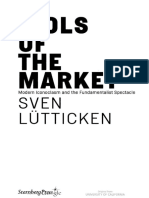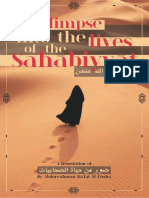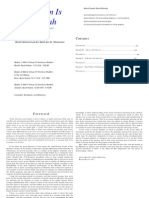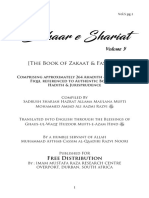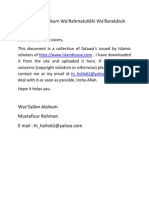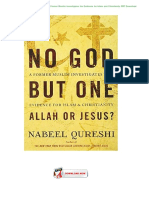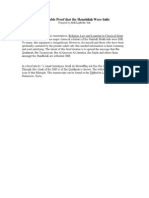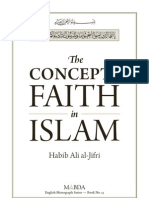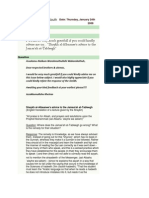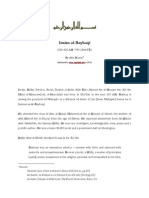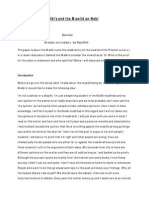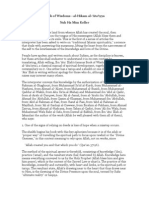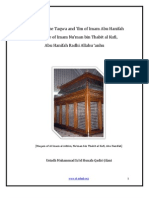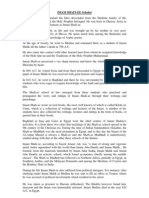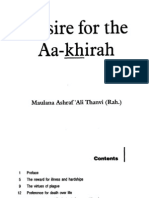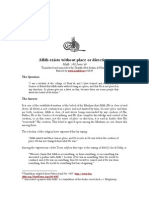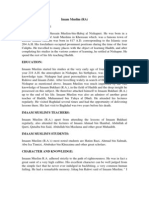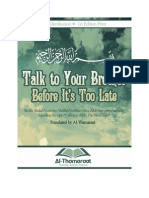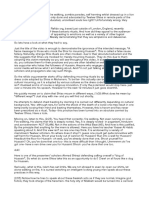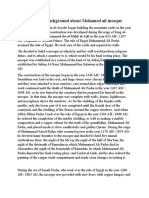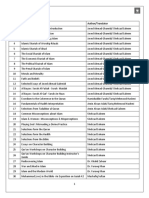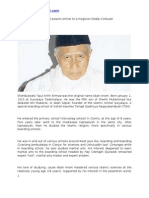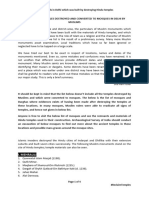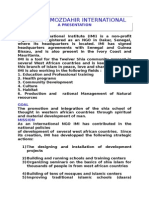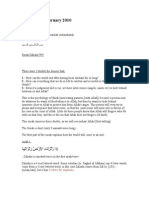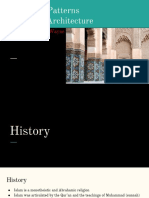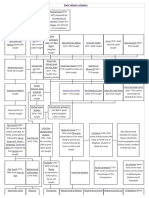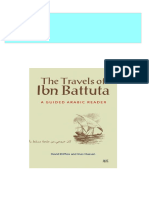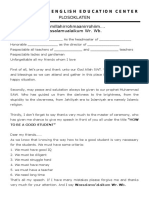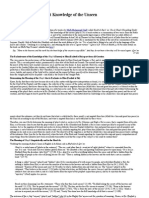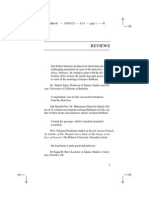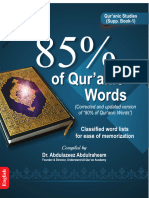Warning From What The Speech of Yasir Qadhi Contains From Falsehood
Warning From What The Speech of Yasir Qadhi Contains From Falsehood
Uploaded by
MusaMillingtonCopyright:
Available Formats
Warning From What The Speech of Yasir Qadhi Contains From Falsehood
Warning From What The Speech of Yasir Qadhi Contains From Falsehood
Uploaded by
MusaMillingtonOriginal Title
Copyright
Available Formats
Share this document
Did you find this document useful?
Is this content inappropriate?
Copyright:
Available Formats
Warning From What The Speech of Yasir Qadhi Contains From Falsehood
Warning From What The Speech of Yasir Qadhi Contains From Falsehood
Uploaded by
MusaMillingtonCopyright:
Available Formats
Warning from what the speech of Yasir Qadhi
contains from falsehood.
Divided into three parts
(1)A peaceful dialogue with Yasir Qadhi
(2)Rebutting the lies of Yasir Qadhi regarding the
Muhaddith Naasir Ud Deen Al Albaani and the call of
the Salafis
(3)Differences within the Salafi movement opinions
or deviation?
Authored by: Musa Millington At Trinidadi
Introduction
. " :
" .
I ask Allah taala to bless this small effort of mine to clarify the truth regarding Yasir Qadhi.
This individual, who is a known international speaker, has been travelling worldwide on a
mission to spread the message of secretarian nihilism. In other words, he wishes to establish co-
operation with a myriad of groups and organizations regardless of their ideology. Furthermore,
he has been relentless, and rather reckless, in refuting Salafeeyah and the Salafis when the
opportunity presents itself. Although this may seem quite a long treatise to read I hope that those
who get their hands on this read it carefully and reflect and to neither let fear nor favour cloud
their judgment. And Allah guides who he wishes toward the straight path.
Musa Millington.
A peaceful dialogue with Yasir Qadhi
. .
Allah taala has mentioned in his book:
Say [O Muhammad] Shall we inform you of the greatest losers as to their deeds? They are those
whose effort is lost in the worldly life while they think they are doing good. [18: 103-104]
Likewise he has mentioned:
The example of those who were entrusted with the Torah and then did not take it on is like that
of a donkey who carries volumes of books. [62:5]
These verses demonstrate that many may perceive that they are upon the correct path, however,
they are in fact astray since they have not traversed upon the straight path. Additionally, that
there may be those who memorize and study yet they are completely devoid of understanding
what is within the books. Hence, they are similar to donkeys that carry books yet are ignorant of
their contents.
Unfortunately, nowadays the Muslims have been affected with speakers whose understanding of
the Quran and the Sunnah is wanting. Rather than govern, lecture and answer questions
according to the texts and its principles they do so based upon their whim. The Prophet (
) spoke about this when he said about this plague of ignorance in the latter days when he
said:
Verily Allah does not take away knowledge by taking it from the hearts of men but he takes
away knowledge by taking away the scholars. Until there does not remain a scholar the people
will take ignorant heads as leaders. They will be asked and (those who are asked) will answer
without knowledge. Therefore they would be astray and lead others astray. [Bukhari & Muslim]
This Hadeeth, which certainly pertains to the times we live in, shows us that the scholars are
those who carry the knowledge in their chests. However, when they die ignorant leaders will rise
among the masses and misguide others due to their ignorance. It also demonstrates that one we
as Muslims sever the lineage between us and the scholars we would go astray.
1
From those who fit such characteristics is Yasir Qadhi. Although he has certificates and titles it
is obvious that he did not grasp what he has studied. Furthermore, he and those who are upon his
bandwagon with to make themselves the point of return for Muslims in western societies while
abandoning and disregarding their intellectual lineage.
From that which Yasir Qadhi has proclaimed is that Salafeeyah is no longer intellectually
stimulating for him! This claim, if understood properly, means that his intellect is no longer
satisfied with the understanding of Abu Bakr, Umar, Uthmaan and Ali ( ) regarding
his understanding of the religion of Allah taala. Hence, viewing himself as the saviour of the
religion, he has been touring throughout the western world in order to effectively and
systematically dismantle the foundations of Islaam lecture by lecture. For this reason I have
embarked upon writing this short treatise regarding his recent speech which would make it clear
that he is a misguided individual who the Muslims should beware of.
In this first treatise the topic of Salafeeyah (the methodology of the Salaf) will be dealt with in
the following manner:
Section one: What is Salafeeyah?
Section two: The obligation of following the methodology of the Salaf.
Section three: Yaasir Qadhis statements according to the scale of the Shareeah.
Conclusion.
May Allah bless this effort and the other treatises which are related to this issue.
Musa Millington.
1
This issue about the scholars will be dealt with in part three wherein Yaasirs proposition of not outsourcing
verdicts will be discussed.
Section One: What is Salafeeyah?
Before going in this matter it is a must that the Muslims should be informed regarding the
manner in which they should take their stances regarding information that is received. Our stance
is that we should neither accept nor reject information immediately but rather it should be
measured according to its compliance with the Quran and the Sunnah. Hence we should be
reflective rather than reactive and open minded rather than bigoted.
The word Salafeeyah comes from the word salaf () which refers to those who preceeded or
came before this current era. This word is in fact used in many narrations. One of which is the
Hadeeth of the Prophet ( ), wherein he informed Faatimah ( ) that he
was going to die, told her:
Fear Allah and be patient for verily I am a blessed Salaf for you. {Muslim)
According to Islamic terminology, it refers to those who preceeded from the first three
generations of Islaam and this is taken from a Hadeeth of the Prophet ( ) narrated
in Imam Ahmads Musnad where he said:
, ,
The best of people are from my generation, then those who follow them and then those who
follow them [Bukhari and Muslim]
And in another narration collected by Imam Ahmad, the Prophet, , was asked:
Who are the best of people? He then said:
, ,
Myself and those who are with me, then those upon this path, then those upon this path.
[Tirmidhi]
The last two Hadeeth clarifies to us that the best of the Muslims pertaining to worship, etiquettes
and understanding of all aspects of the religion were those who are called the Salaf-Us-Saalih.
They are the Prophet ( ), his companions ( ), the Taabieen who are the
students of the companions and he Taabi Taabieen who are the students of the Taabieen.
Regarding the usage of the word Salafi ( ) it has been misunderstood by most people, even
those who claim to adhere to this path, to signify a particular group
2
. However there are many
scholars of the past, previous to Shaikh Muhammad Ibn Abdul Wahhab, who have used this
2
Hence you find various attachments to this word like Salafi Jihadi, Salafi Siyaasi, Salafi Ilmi etc.
term to signify total adherence to the methodology of the most virtuous generations of Muslims
in their understanding of Islaam.
Imam As Samaani (465 Hijrah) said in his book Al Ansaab: Salafi () with the Fathah on
the Seen and the Laam and the last letter being Faa, this is an ascription to the Salaf and taking
on their Madhab (way) according to what you heard.
3
Imam Ibn Atheer (606 Hijrah), the famous historian, in his book called Tahtheeb Al Ansaab
upon quoting Imam As Samaanis speech said: And a group was known by this.
4
Al Haafidh Adh Dhahabi who is a known Muhaddith of the 8
th
century Hijrah said in his book;
Siyar Alaam An Nubala: Salafi ( ) with two Fathah, he is one who is upon the way of the
Salaf.
5
Imam Adh Dhahabi said regarding Imam Ad Daaraqutni: The man neither entered into
rhetoric nor argumentation and he never delved into it. Rather, he was Salafi.
6
He also said: What the Haafidh (in Hadeeth) is in need of is to be fearful of Allah, intelligent, a
grammarian, a linguist, pure in heart and Salafi
7
Likewise, according to the consensus of the scholars, to use this ascription is acceptable. Shaikh
Ul Islaam Ibn Taymeeyah said: And there is no blame on the one who shows that he is upon
the way of the Salaf, and ascribes to it. Rather it is obligatory to accept this by consensus
because verily the way of the Salaf is nothing but the truth.
8
In addition to this many of the contemporary scholars have demonstrated that the usage of this
ascription is indeed permissible and that all Muslims should follow the path of the Salaf Us
Saalih. This is well known and widespread among the people however there is no harm in
bringing some of their statements.
Shaikh Abdul Azeez Ibn Baaz said when asked about the saved sect: They are the Salafis
and everyone who traverses upon the way of the Salaf.
9
He also said: Verily the Salaf are those of the virtuous generations. Therefore, the one who
suffices with their narrations and traverses upon their way is a Salafi.
10
3
The Salafi Manhaj according to Shaikh Al Albani: Page, 12
4
Ibid
5
Ibid
6
Ibid
7
Irshaad Al Bareeyah Ela Shareeyah Al Intisaab Lis Salafeeyah: Page 14
8
Basair Thawil Sharaf: Page 21
9
Irshaad Al Bareeyah Ela Shareeyah Al Intisaab Lis Salafeeyah:Page: 17
10
Ibid: Page 8
Shaikh Muhammad Ibn Saalih Al Uthaimeen said in Liqaa Al Baab Al Maftuuh: The Salafi
is the one who traverses upon the way of the Salaf in his beliefs, statements and actions
anywhere he may be. It is unlawful for us to divide the Muslims saying: This is a modernist, this
is a Salafi and the likes of this. Rather it is compulsory upon everyone to be Salafis, not upon the
basis of partisanship but rather because its the truth. Allah has said:
And the first forerunners in faith among the Muhajireen (emigrants) and the Ansaar (the
helpers) and those who follow them in goodness Allah is pleased with them and they are pleased
with him. [9:100]
He also said in his explanation of Aqeedah Al Waasiteeyah: Therefore, Ahlus Sunnah Wal
Jamaah they are upon the belief of the pious predecessors, even those who come afterward
until the day of judgment once they traverse the way of the Prophet ( ) and his
companions he is Salafi.
11
Shaikh Naasir Ud Deen Al Albani said: But there are some who claim knowledge that dislike
this ascription (to the Salaf) on the premise that it has no basis! So he says: It is unlawful for a
Muslim to say I am Salafi. It is as if he is saying that it is unlawful for a Muslim to say that I
follow the Salaf Us Saalih (the pious predecessors) in their beliefs, worship and manners.
12
He also said: And there is no doubt that the ascription that brings clarity and is distinct it is to
say I am a Muslim upon the book, the Sunnah who is upon the methodology of the pious
predecessors, and it is to say in summary: I am Salafi.
13
Shaikh Muqbil Ibn Haadi said in his introduction to the book Irshaad Ul Bareeyah: I have
searched through the topics of the book of our brother, the virtuous Shaikh, Hasan Ibn Qaasim
Ar Raymee called: Irshaad Ul Bareeyah Ela Shareeyah Al Intisaab Ela Salafeeyah, and I
found that he has benefitted others and done well with this great book in refuting the innovators
who perceive that it is unlawful to ascribe to Salafeeyah so we say to them, oh those who cover
the truth with falsehood we are not the first to make up this name return to the book called Al
Ansaab by As Samaani.
14
Shaikh Saalih Al Fawzaan said: Salafeeyah is the saved sect and they are Ahlus Sunnah Wal
Jamaah and is not a sect from the sects that are called sects nowadays.
15
11
Ibid: Page 17
12
The Salafi Manhaj according to Shaikh Al Albani: Page, 18
13
The Salafi Manhaj according to Shaikh Al Albani: Page, 20
14
Irshaad Al Bareeyah Ela Shareeyah Al Intisaab Lis Salafeeyah: Introduction.
15
Irshaad Al Bareeyah Ela Shareeyah Al Intisaab Lis Salafeeyah:Page: 22
Shaikh Bakr Abu Zaid said: Be a serious Salafi, upon the way of the pious predecessors
from the companions ( ) and those after them. From those who sufficed with their
narrations in all the matters of the religion in Tawheed, worship and other than it
Shaikh Muhammad Ibn Saalih Al Uthaimeen said in commenting upon this said: This is from
the most important matters. That a person is upon the way of the Salaf Us Saalih in all the
matters of the religion, in Tawheed, in worship, his daily dealings and other than it.
16
Therefore, to posit that the word Salafi was innovated recently is simply preposterous and
contradictory to the Historical fact.
17
Rather this ascription, which is not blameworthy, has been
used for centuries in order to clarify that this methodology, the methodology of the pious
predecessors, is in true methodology of Ahlus Sunnah Wal Jamaah which has no error within it
because it is based upon the Quran, the Sunnah and the narrations of those virtuous generations.
16
Sharh Hilyah Taalib Ul ilm: Page: 17
17
We have to remember that being ignorant of something doesnt necessitate that it is non-existent.
Section Two: The obligation of following the Salaf Us Saalih.
Now that we know who the Salaf and the Salafis are it is upon us to know that it is obligatory to
follow them in the manner wherein they practiced the religion of Allah and on this note there
are several evidences from the Quran, the Sunnah and narrations from the Imams of this religion
which clearly indicate this.
Evidences from the Quran
Allah has said:
And the first forerunners in faith among the Muhajireen (emigrants) and the Ansaar (the
helpers) and those who follow them in goodness Allah is pleased with them and they are pleased
with him. [9:100]
Imam Ibn Katheer said regarding this verse: Allah gives news about him being pleased with
those who preceeded from the emigrants and the helpers and those who follow them in goodness
and them being pleased with him from what he has prepared for them from the pleasures of
paradise that remains.
18
Imam Ash Shawkani said regarding the aforementioned verse:
Meaning those who follow those who preceeded from the emigrants and the helpers. And they
are those who come later than them from the companions and those after them until the day of
judgment.
19
Shaikh Ul Islaam Ibn Taymeeyah said: Therefore, he is pleased with those who follow those
who have preceeded until the day of judgment. This therefore shows that those who follow them
do that which Allah is pleased with
20
Likewise Allah taala has said:
And whoever opposes the Messenger after clear guidance has come to him and follows a way
other than the way of the believers we leave him to what he has chosen and throw him into the
hellfire. [4:115]
Shaikh Naasir Ud Deen Al Albani said: Allah taala is away from doing things without purpose.
And there is no doubt that him mentioning the way of the believers has immense wisdom and
18
Irshaad Al Bareeyah Ela Shareeyah Al Intisaab Lis Salafeeyah:Page: 25
19
Ibid
20
Al Iqnaa Fil Intisaab lis Salafeeyah: Page 36
benefit. It gives evidence that there is an important obligation and it is that our following the
book of Allah and the Sunnah of his Messenger ( ) has to be in accordance to
what the first Muslims were upon. And they are the companions of the Messenger of Allah (
) and then those who follow them and then those who follow them
21
Likewise Allah has said:
If they believe in what you have believed in then they have become guided. [2:137]
Ibnul Qayyim Al Jawzeeyah said:
And the angle used as evidence is that following the companions in belief is central to
guidancewhich safeguards from dissension and misguidance. And it covers following them in
their beliefs, statements and actions because all of them enter into the meaning of Imaan
according to the Salaf. And seeking guidance and Imaan are from the most obligatory of matters
and staying away from dissension and misguidance fall into the obligatory matters. This
therefore shows that the most compulsory of matters is following the companions.
22
Likewise Allah has said:
Say this is my way I call to Allah upon insight, myself and those who follow me. And glory be
to Allah and I am not from those who make partners with Allah. [13:108]
Imam Ibn Abil Izz said before quoting this verse: And the best of generations traversed upon
what the Messenger ( ) was upon, and they are the companions and those who
follow them in goodness. The first and last are advised such and those who came before and after
traverse upon such. And in all of this they follow their Prophet Muhammad ( ).
And upon his methodology they traverse.
23
Allah has said:
Guide us onto the straight path. [1:6]
Imam Abu Haatim narrated in his Tafseer on the authority of Abu Aliyah: It is the Prophet (
) and his two companions after him.
24
21
The Salafi Manhaj according to Shaikh Al Albani: Page: 20
22
Al Iqnaa Fil Intisaab lis Salafeeyah: Page 34
23
Sharh Aqeedah At Tahaweeyah: Vol 1/114.
24
Ibid: Page Vol 1/28.
Ibnul Qayyim Al Jawzeeyah said: Verily the straight path contains within it knowledge of the
truth, practicing it, putting it above anything else, loving it, acting upon it, calling toward it and
struggling against its enemies according to ones ability.
And the truth is what the Prophet ( ) and his companions were upon
25
25
Madarij Us Saalikeen: pg: 77
Evidences from the Sunnah.
From this is the statement of the Messenger of Allah ( ):
" "...
There will always be a people from my Ummah who are manifest upon the truth. [Bukhari]
Imam Al Bukhari mentioned: Meaning the people of Hadeeth.
26
Additionally Ahmad Ibn
Hanbal mentioned: If they are not the people of Hadeeth I dont know who they are.
27
Al Haafidh Al Hakami mentioned in his book known as 200 questions and answers in creed:
This group is the saved sect from the 73 sects as the Prophet ( ) singled it out
from these sects with his statement: Everyone of them is in the fire except one and it is the
Jamaah (the group). And in a narration he said: They are upon what I am upon today and my
companions.
28
Second Hadeeth: The Prophet ( ) said:
, "
: " : "
And my Ummah will separate into 73 different groups all of them are in the hellfire except one
They (the companions) said: Who are they Oh Messenger of Allah? He said: They are upon
what I am upon today and my companions. [Tirmidhi]
Shaikh Muhammad Ibn Saalih Al Uthaimeen said: This Hadeeth clarifies the meaning of
saved. Therefore whoever is upon that which the Prophet ( ) was upon and his
companions he is saved from innovation. And all of them are in the fire except one.
Therefore it is saved from the hellfire. Therefore being saved means to be saved from innovation
in this world and saved from the hellfire in the next.
29
Ibnul Qayyim Al Jawzeeyah said regarding this Hadeeth: And this (Hadeeth) points toward that
that which differentiates between truth and falsehood is following the methodology of the
companions in what they were upon because every deviant group ascribes themselves to the
Sunnah and none of them clearly distance themselves from it. Therefore, following that which
the Companions were upon in the time of Prophethood and what the Prophet ( )
left them upon is central to success and guidance. And contradicting it is from the way of the
26
Sharaf Ashaabul Hadeeth:Page 62
27
Ibid: Page 61
28
200 Questions and answers on Aqeedah: Page 181.
29
Sharh Aqeedah Al Waasiteeyah: Vol 1/51
destroyed sects that are under threat of hellfire because of their opposition to the methodology of
the Companions.
30
Third Hadeeth: The Prophet ( ) said:
" ,
"...
Therefore whoever lives after me he will see much differences. Upon you is my Sunnah and the
Sunnah of the rightly guided Calips after me. Grab unto it with your molar teeth. [Tirmidhi]
Ibn Rajab Al Hanbali said: This is information from him ( ) regarding what
would occur in his nation after him from differing in the basis of the religion as well as the
branches, and in actions, statements and beliefs. And this is similar to that which was narrated
from him regarding the division of his Ummah upon 70 plus sects and that all of them are in the
fire except one and it is (that group) which is upon that which he was upon and his companions.
And for this reason, when separation and differences occur, this Hadeeth orders (the Muslims) to
hold unto his Sunnah and the Sunnah of the rightly guided Caliphs after him. And the word
Sunnah means a way upon which someone traverses. Therefore, it covers ones adherence to
what he ( ) was upon as well as his rightly guided Caliphs from beliefs, actions
and statements and this in itself is the complete Sunnah And his order to follow his Sunnah
and the Sunnah of the rightly guided Caliphs after ordering listening and obedience to the
Muslim ruler in general shows that the Sunnah of the Rightly Guided Caliphs is followed like the
Sunnah unlike other than them from the Muslim rulers.
31
Fourth Hadeeth: The Prophet ( ) said:
" , ,
"
The stars are a safety for the sky. Therefore when the stars go whatever is ordered (by Allah)
will happen to the sky. And I am a safety for my companions therefore when I go whatever was
promised will come to them. And my companions are a safety for my Ummah therefore when
my companions go whatever was promised to my Ummah will come to them. [Muslim]
Shaikh Saleem Al Hilaali said: The Messenger of Allah ( ) has made his relation
to his companions ( ) like the relation of those who arrive later from the Muslim
Ummah to his companions and like the relation of the stars to the sky. And from what is known:
This similitude that the Prophet ( ) gave shows the obligation of understanding
(the religion) like the companions of the Messenger
32
30
Basair Thawil Sharaf: Page 75
31
Jaami Uloom Wal Hikam: Page 704.
32
Basair Thawil Sharaf: Page 65
Fifth Hadeeth: The Prophet ( ) said:
The best of people are from my generation, then those who follow them, then those who follow
them. [Bukhari & Muslim]
Ibnul Qayyim Al Jawzeeyah said: The Prophet ( ) mentioned that the best of
generations is his generation and what follows by this is putting them foremost in all which is
good and if it were that they were good in some aspects they would not have been the best of
generations.
33
33
Ibid: Page 62
From the statements of the early scholars of Islaam
As for what follows in this section I will simply quote the statements of some of the many
scholars who encouraged the Ummah, and demonstrated that it is obligatory to follow the way of
the Salaf Us Saalih.
Abdullah Ibn Masuud said: Whoever wishes to imitate someone let him imitate the
companions of the Messenger of Allah because they had the most righteous hearts from this
Ummah, and they were the deepest in knowledge and least likely to deviate, and the most
established upon guidance, and upon the best of conditions. They are a people who Allah chose
them to be companions of the Prophet ( ), and to establish his religion. Therefore,
know their virtues and follow their way because they were upon the straight guided path.
34
Imam Abu Haneefah said: Upon you are the narrations and the way of the Salaf. And beware
of every newly invented matters because all of them are Bidah.
35
Imam Ahmad Ibn Hanbal said: The basis of the Sunnah according to us is to adhere to what the
companions of Muhammad ( ) were upon, and to follow them. And to abandon
innovations because every innovation is misguidance
36
Imam Al Awzaaee said: Upon you are the narrations of those who came before, even if the
people reject you. And beware of the opinions of men even if they decorate them with their
statements.
37
He also said: Be patient upon the Sunnah and stop where the people have stopped and say with
they said and keep silent about what they were silent about. And follow the way of your pious
predecessors because what is sufficient for them is sufficient for you.
38
Imaam Al Bukhari said: And they (the scholars who he met) encouraged others toward that
which the Prophet ( ) was upon and his companions.
39
These are only some of the many evidences and statements of known Imams regarding the
obligation of following the companions of the Messenger ( ). After this
clarification there should be no doubt within the mind of the reader that it is upon himself to
follow the way of the Salaf as it is the truth, the straight path, the saved sect and the victorious
group. And what is after clear, distinct truth based upon authentic evidences except falsehood?
34
Wujoob Luzoom Al Jamaah: Page 279
35
Ibid
36
Sharh Usool Ul Ittiqaad: 1/257
37
Sharaf Ashaabul Hadeeth: No: 6
38
Irshaad Al Bareeyah Ela Shareeyah Al Intisaab Lis Salafeeyah:Page: 28
39
Sharh Usool Ul Ittiqaad: 1/285
It has become apparent to the noble reader that one must apply the methodology of the Salaf in
ones practice of Islaam as it is based upon the sturdy foundation of the Book of Allah, the
Sunnah of his Messenger ( ) and the statements of our noble pious predecessors.
As for those who wish to thread on a path contrary to their own it is without doubt that they
would be upon manifest misguidance.
Section Three: The Reality of Yasir Qadhis statements regarding the
methodology of the Salaf.
As aforementioned, there are many clear proofs from the Quran, the Sunnah and the statements
of the Salaf which demonstrate that the way of the Salaf is true Islaam and is obligatory upon the
Muslims to traverse upon. Therefore, anyone who claims that it is not obligatory upon the
Muslim to traverse upon their path has opposed clear evidences and has gone astray.
Imam Al Barbahari stated: The basis upon which the Jamaah is built is the companions of
the Messenger of Allah ( ), and they are Ahlus Sunnah Wal Jamaah. Whoever
does not take from them he has gone astray and innovated.
40
Hence, unfortunately, Yasir Qadhi, who has stayed many years in Madeenah and knows many of
these verses, narrations and Ahadeeth has gone astray upon knowledge and has followed his
desires without a doubt. Furthermore, he has travelled worldwide in an effort to demolish this
foundational matter of the religion by promoting sectarian relativism.
41
Upon this premise, Yasir Qadhi (may Allah guide him) in a recording wherein he denounced
Salafeeyah stated that he left the movement for the following reasons:
I found that the movement was not as intellectually stimulating as I like it to be. I think that its
not really capable of addressing modern issues its very intransigent in the way it views certain
ideas. Its also very hostile with anything that disagrees with its interpretation so I find myself
disagreeing with a lot of methodological issues associated with the Salafi movement.
From his statements one can take three major factors as to why he left the Salafi movement
1. It is not intellectually stimulating as he would like it to be!
2. It is incapable of addressing modern issues.
3. It is very hostile with one who disagrees with its interpretation.
These statements will be taken apart one by one to show its falsehood in order that the reader
understands that the one who made these statements hasnt looked at this matter critically.
40
Irshaad Us Saari Sharh Al Barbahari: 41
41
In other words he believes that there is no true measure for the truth and that everyone has their opinion.
However, as aforementioned the truth is what Allah has sent to the Prophet ( ) according to the
manner which he and his companions practiced Islaam. However, he needs to abolish any semblance of truth in
order to unite the Ummah.
Foundation #1: The Salafi movement not being intellectually stimulating.
After that which has been clarified in the previous chapter one would conclude that Salafeeyah
refers to the way of the companions and that a Salafi is one who follows the companions.
Therefore, for Yasir to describe Salafeeyah as a movement shows that he never understood what
Salafeeyah meant in the first place because a movement usually refers to something that is
newly invented and adherence to the path of the Salaf (Salafeeyah) can never be something
newly invented since Allah, his Messenger and the early Muslims made it obligatory upon the
Muslims to adhere to this methodology.
Another point is that possibly he perceives that this movement is akin to that of the Ikhwaan
Al Muslimeen and the Jamah At Tableegh and this couldnt be further than the truth. Shaikh
Naasir Ud Deen Al Albani said:
And this matter of the obligation of following the pious predecessors is not something
innovated. Rather it is an obligation that (the evidences) have pointed toward
42
Hence, there is no way possible that Salafeeyah can be a movement when it is based upon clear
evidences. Additionally, the Ikhwaan Al Muslimeen was established in the 1930s by Hasan Al
Banna, the Jamaah Ut Tableegh was found over one hundred years ago by Muhammad Ilyas Al
Kandahlawi. However, Salafeeyah is found in the Quran, the Sunnah and the statements of our
pious predecessors.
Another point to consider is that since Yasir has the view that Salafeeyah is a movement he
postulated to his audience that it is human and flawed rather than being the correct methodology,
which is that of the Prophet ( ). He then used this point as a springboard to
propose that are many different genres of Salafeeyah saying:
Within this trend there are multiple movements within Salafi Islaam that disagree about many
issues and in particular issues of politics and issues of militancy. You have pacifist Salafis, you
have militant Salafis
My dear brothers and sisters it seems that Yasir forgot an important principle in terms of
verifying information. In other words, a lot of people can ascribe many appellations to
themselves
43
however statements and actions are precedents which decide whether we affirm
these descriptions or not. The Prophet ( ) said:
" "
Clarification is upon the claimant. [Bukhari]
42
The Salafi Manhaj according to Shaikh Al Albani: Page: 24
43
Like how Yaasir says he is a scholar.
Likewise, a poet once said:
..........
Claims upon which clarification is not affirmed makes those who make that claim only
claimants.
Likewise the famous line of poetry where it was said:
..........
And everyone claims to have a connection with Laila but Laila does not affirm this for them.
Additionally, the scholars of this Ummah have clarified that the ascription toward Salafeeyah is
not sufficient. Rather, the one who ascribes to this must complement it with actions that go in
accordance to the way of the salaf.
Shaikh Abdul Azeez Aal Ash Shaikh the current grand Mufti said:
A person is not judged by what he calls himself or what he ascribes to rather things go
according to their reality. Imaan is not by what one wears or what one wishes rather it is what
stays in the hearts and are made truthful by the actions. Salafeeyah in its reality they (those who
ascribe to it) are the ones who follow the book of Allah and the Sunnah of his Messenger and
proceed upon the way of the Salaf of this Ummah from the companions and the Tabieeen
44
And Shaikh Salih Al Fawzaan one of the major scholars of Saudi said:
As for the Salafi they are those who are upon the methodology of the pious predecessors. Hence
if he is upon the methodology of the pious predecessors it is said that he is Salafi. It refers to the
one who is truly upon their methodology, not the one who ascribes himself or calls himself by
it only.
45
Shaikh Muhammad Ibn Saalih Al Uthaimeen said:
Salafiyyah is following the way of the Prophet (sal-Allaahu alayhe wa sallam) and his Sahabah
for they are our Salaf (predecessors) who preceded us, so following them is Salafiyyah. As for
taking Salafiyyah as a special Manhaj (Methodology) such that everyone who differs with it is
considered astray even if he was on the truth (i.e upon Salafiyyah); then this is beyond doubt
opposite to Salafiyyah.
46
44
http://www.youtube.com/watch?v=8Wgj9j4uvE0&feature=related
45
http://www.youtube.com/watch?v=pCCUJIyMC_g&feature=related
46
http://aa.trinimuslims.com/showthread.php?t=2514
Hence, the yardstick that Salafeeyah is measured by is not by those who ascribe to it. Rather, it is
measured by the evidences from the Quran, the Sunnah and the consensus of the Salaf Us
Saalih. Imaam Ibn Rajab Al Hanbali said:
The truth is not known by the men but rather the men are known by the truth.
Salafeeyah is not about following every statement of scholars such Shaikh Ibn Baaz, Shaikh Ibn
Uthaimeen, Shaikh Al Albani, Shaikh Muqbil, the Lajnah Ad Daaimah, Shaikh Shaikh Rabee
Ibn Haadi Al Madkhali, Shaikh Yahya Al Haajoori etc. We benefit from their speech and learn
Islaam from them however it is a must to have in mind that that which takes precedence is
following their methodology. Therefore, if anyone of them makes statements or do actions
which conflict those which were clarified in the Quran, the Sunnah and the speech of our pious
predecessors their statements are rejected.
47
Additionally, Yasir claims that it is not intellectually stimulating to him. This begs the question
as to whether or not he has a definite criteria as for what can be labeled as intellectual
stimulation. Additionally, he must support this with clear, distinct evidences which show that
that the way of the Salaf is indeed not intellectually stimulating, if he has any standards to
deduce this at all.
Furthermore, Yasir, may Allah guide him, has demonstrated without doubt that by opposing the
methodology of the pious predecessors of the religion he has opposed that which is
intellectually sound. Despite the fact that our predecessors did not have the technology, or large
metropolises we have in this modern era their insight regarding the usage of textual evidences
from the religion was and is still unparallel. Therefore one finds that when dealing with the
issues of belief, jurisprudential issues and other than that one would find within it truth,
clarity, simplicity and ease in their statements.
As for what occurred after their time from the introduction of Aristotles books into the
Muslim world until this era of post modernism it is filled with obscurity, unnecessary
rhetoric, falsehood, hardship and contradiction. This is because the modern or ancient
philosopher was preoccupied with searching for the truth through their desires and intellect.
However, in Islaam, the truth is already manifest and clear. Allah has said:
And say the truth is from thy Lord. Therefore whomsoever wishes, believe in it, and
whomsoever wishes, disbelieve in it [18:29]
47
This is something a lot of brothers and sisters have not come to terms with in that Salafeeyah does not hinge
upon individuals but rather it hinges upon the truth. As Shaikh Rabee Ibn Haadi said once: Between us and you
are the books of the Salaf.
Shaikh Ul Islaam Ibn Taymeeyah said: What has been authentically narrated does not oppose
the intellect. And I have reflected upon what people have disagreed upon and I found that
whatever opposed clear evidences were erroneous doubts which the intellect knows is erroneous.
Rather the intellect would establish the opposite (meaning the clear evidences) that goes in
accordance with legislation.
48
Jamal Al Baadi in his thesis
49
said the following:
Ahlus Sunnah follow and dont innovate. And they have held unto the revelation and have not
mixed it with adulterations and obscurities as the like of what happened to the people of rhetoric
and philosophy. Therefore, the result of this is that their Tawheed is sincere
50
, and their
knowledge is beneficial and their belief/faith is correct. As for the people of innovation they have
been prohibited from this good. And the result of them not submitting to evidences is that
innovations became plentiful from, rather many of them have fallen into Shirk and Allahs
refuge is sought. And their knowledge is mixed with truth and falsehood. And the Imaan of
many of them is shaken
51
and this becomes apparent based upon their methodology.
52
Therefore, although Yasir may sound like an intellect or a thinker he needs to rethink and reflect
upon his stance regarding the Salafi methodology. It is obvious that his understanding of the
evidences and the speech of our pious predecessors is rather shallow and superficial for he has
indeed not given the speech of the Salaf its right.
53
Ibn Rajab Al Hanbali said in his tremendous book, Clarification of the virtue of the knowledge
of the Salaf over those who came after them:
Therefore, precision in what one narrates from them (the Salaf) is from the best of knowledge
in addition to understanding it, pondering over it and deriving knowledge from it. And there is
no good in much of what occurred after them from plentiful speech except if it is an explanation
of their speech (meaning the speech of the Salaf.
As for what opposes their speech then most of it is falsehood and there is no benefit in it. And
their (the Salafs) speech is more than enough. For there is not from the speech of those after
them from truth except that he would find that which is present in their speech in a more
summarized expression and in their speech one finds much meaning and precise analysis
which those after them neither thought of nor were guided to.
48
Sharh Aqeedah At Tahaweeyah: Page 26.
49
Which was checked by Sh. Ali Naasir Al Fiqhi.
50
Meaning they worship Allah as one.
51
Yasir has admitted that he had a crisis in understanding the religion when he was in Madeenah! If he held unto
the pristine Islamic methodology and sat with the likes of Sh. Abdul Muhsin and Shaikh Saalih As Suhaimi maybe he
wouldnt have had such a crisis.
52
Wujoob Luzoom Al Jamaah: Page: 214
53
There is a difference between reading and reading with understanding.
Therefore, those who do not take knowledge from their speech have let all that good escape
from him. In addition to that he/she would fall into much misguidance by following those who
came after them.
54
He also said:
Therefore, beneficial knowledge from all these sciences consists of precision regarding the
evidences from the Quran and the Sunnah and understanding their meanings and to limit oneself
to that which was narrated from the companions, their students and those who followed them in
interpreting the Quran and Hadeeth and in that which was narrated from their statements in the
issues of Halaal and Haraam and abstinence (from the Dunya) and heart softeners and knowledge
(of Allah) and other than this. And making effort in differentiating that which is authentic from
what is inauthentic firstly and then making effort in stopping at its meanings and understanding it
secondly. And in this is enough for the one who is sensible and a preoccupation for the one
who keeps busy and pays emphasis toward beneficial knowledge.
55
It is therefore strange, that great scholars, the likes of Ibn Rajab Al Hanbali, who wrote an
explanation of Saheeh Al Bukhari, Shaikh Ul Islaam Ibn Taymeeyah, Shaikh Ul Islaam Ibnul
Qayyim Al Jawzeeyah, Ibn Katheer, Shaikh Ul Islaam Muhammad Ibn Abdul Wahhab and
recently the likes of Shaikh Ibn Baaz, Shaikh Al Albani, Shaikh Ibn Uthaimeen and Shaikh
Muqbil Al Waadiee spent their whole lives reflecting, understanding, explaining and
propagating the methodology of the Salaf to the masses. Thousands of books have been written
by these scholars in different Islamic sciences, the foundation of which was the speech of the
pious predecessors. Yet Yasir Qadhi who hasnt even written one hundredth or even one
thousandth of what these scholars have written dares to say that the Salafi movement is
not intellectually stimulating?
Ibn Abil Izz Al Hanafi describes the deplorable condition of such callers when he said:
For verily all of them have been veiled from knowing the status of the Salaf, and their deep
knowledge, and the little burden (they put on their speech), and complete insight.
56
I wish that those who read these words of Ibn Abil Izz reflect on them and understand its reality
especially in these times when trials have become abundant. The reality is not that the Salafi
movement isnt intellectually stimulating. Rather, the real issue is because Yasir is clueless
regarding his understanding of the speech of the Salaf Us Saalih and therefore seeks to
demolish that which he is ignorant of. As the great scholar Shaikh Muqbil used to say in many
a cassette: Whoever is ignorant of something is an enemy to it.
54
Bayaan Fadl Ilm As Salaf: Page 67-68.
55
Ibid: Page 72
56
Sharh Aqeedah At Tahaweeyah: Page 1/26.
Furthermore, this statement by Yasir Qadhi reflects the stance that the Mutazilah, the
Jahmeeyah and the Asharis regarding those who follow the way of the Salaf. This same
individual, who did his doctorate in YALE because he wanted more freedom
57
has indeed
followed the way of those who he wrote about in his masters thesis. These aforementioned
groups, who are not from Ahlus Sunnah Wal Jamaah, accuse the Salafis of being Hashaweeyah,
in other words, ignorant blind-followers who have no true understanding of the evidences.
58
This attitude of theirs is also manifested in their statement: The way of the Salaf is safer but the
way of those who came afterward is more knowledge based. This was because both the
Mutazilah and the Asharis, delved into the books of Plato and Aristotle and envisaged
themselves as luminaries who were illuminated by the so called guiding light of their intellects.
They therefore turned away from the evidences and sanctified their hypotheses based upon
logical conclusions rather than authentic revelation. Hence, as a result of them traversing
upon this methodology it led them to having a lack of respect for the evidences of the Book, the
Sunnah and the methodology of the early Muslims.
Shaikh Saalih As Suhaimi said about their evil statement:
And he (Shaikh Ul Islaam Ibn Taymeeyah) refuted what was built upon this evil principle (the
way of the Salaf is safer but the way of those who came afterward is more knowledge based)
which can be summarized in two matters:
1. Their ignorance of the way of the Salaf.
2. Their error and misguidance in deeming the way of those who came afterward as correct.
For they have thought that with these two matters that the Salaf didnt know anything except
what is apparent from the evidences which has no meaning (according to them). Therefore they
understand that they are dry statements especially in the issues of Allahs names and attributes
and then the order they put this in is that the true is the false interpretation that those who came
afterward have arrived at. And they are busy with Philosophy and Rhetoric that has made the
Ummah astray and has deviated many from the true methodology that Allah has set
59
Without doubt their statement is based upon manifest error for the following reasons. Firstly, it is
impossible that those who came after the Prophet ( ) and his companions
have a better methodology in understanding the religion than those it was revealed to
because the companions had the Prophet ( ) as their teacher and example.
However, when the Dunya opened to the Muslims, and the books of Greek Philosophers were
translated into Arabic as aforementioned, those who read them became amazed by them and
built the majority of their ideologies upon them and therefore abandoned the Islam of the Prophet
( ) and his companions.
57
As relayed to me by Abdus Salaam As Swedi in 2002.
58
Imam As Sabooni said: The sign of the heretics is that they call the people of narrations Hashaweeyah.
59
Manhaj Us Salaf Aslam Wa Alam Wa Ahkam: Page 2
Secondly, the intellects differentiate from person to person according to their backgrounds
and abilities. Therefore it is improper to rely on the intellect as the point of return for all of
mankind since this would lead to differences and contradictions. Beliefs, daily dealings and the
refinement of character if left to humans would not be clearly defined but rather it would to
intellectual as well as societal chaos. Allah has said:
But if the Truth had followed their inclinations, the heavens and the earth and whoever is in them
would have been ruined. Rather, We have brought them their message, but they, from their
message, are turning away. [23:17]
However, unlike the human intellect, revelation is a constant, absolute, timeless, effective and
usable in the ancient as well as the modern world. It doesnt change according to the condition of
humanity but rather the condition of humanity changes for the better when they adhere to it.
Allah has said in his book:
It is He who has sent among the unlettered a Messenger from themselves reciting to them His
verses and purifying them and teaching them the Book and wisdom - although they were before
in clear error. [62:2]
Thirdly, the Prophet ( ) was given speech that is short yet full of meaning. His
speech covered every aspect of life from creed, worship, character building and daily dealings.
Therefore, one would find that scholars from the past would spend hours extracting benefits from
a few Ahadeeth. However, the speech of those who came after the noble generations was much
and contained little blessing. Rather that which was and still is contained in it is innovation,
misguidance and speech which brings obscurity rather than clarity.
Ibn Rajab Al Hanbali said: Knowledge is not narrating a lot and making plent y of statements.
Rather it is a light that is put in the heart wherein the slave understands the truth and
distinguishes between it and falsehood. And he expresses this with summarized statements that
are straight to the point.
60
Allah has mentioned in his book:
O you who have believed, fear Allah and speak words of appropriate justice. [33:70]
To end these paragraphs regarding the first part of his statement I leave the reader with the
following words of wisdom from one of our eminent Salaf. Imam Al Awzaee said:
60
Bayaan Fadl Ilm As Salaf: Page 67
Be patient upon the Sunnah, and stop where the people have stopped, and say what they have
said, and distance yourself from what they have distanced themselves from, and follow the way
of your pious predecessors for verily what was sufficient for them is sufficient for you.
Foundation #2: The Salafi movement is incapable of handling modern issues.
This statement of his cannot be separated from his previous foundational argument but rather it is
in fact a branch of his it wherein he stated that the Salafi movement, is not intellectually
stimulating to him!
Before analyzing his statement it must be established that Salafeeyah i.e the understanding of the
pious predecessors is constant, timeless and suitable for every era because those who are upon
the methodology of the Salaf are from the saved and aided group until the establishment of the
hour as clarified by several evidences from the Quran and the Sunnah.
Hence, to say that it is incapable of handling modern issues implicates that Salafeeyah was
suitable for a particular period of time, the time of the pious-predecessors, and is not suitable for
modern times. In other words, we as Muslims cannot deal with matters as the Salaf Us Saalih
dealt with them but rather the methodology we use must be different and must evolve since
we life in a different epoch.
This is indeed misguidance that Yasir is positing since the religion itself has been completed
already during the time of the Messenger ( ) and he has clarified that whoever
brings something into the religion that is not from it, it is rejected. Therefore it is improper to
establish a new methodology when the methodology in which Islam has to be understood has
already been clearly outlined.
Indeed Allah has clarified that the religion has a clear methodology. He has said:
To each of you we prescribed a law and a method. [5:48]
Imam As Sadi mentioned in his Tafseer that it is a way and a methodology. The methodology
that Islaam must be practiced therefore remains unchangeable throughout time and place as this
religion has been perfected with regards to worship, daily dealings, politics etc. Allah has said:
This day I have perfected for you your religion and completed My favor upon you and am
pleased with Islaam your religion. [5:3]
Therefore, the methodology upon which we traverse has been given to us by revelation and not
written based upon the desires of men.
Secondly, this statement of misguidance indeed resembles that of Saeed Ramadaan Al Buuti
who said that Salafeeyah was particular to a blessed period of time and is not an Islamic
Madhab (way to traverse). Although it has been clarified that this statement is false because of
the evidences which has preceded, it is one wherein one seeks to nullify the applicability of this
methodology in modern circumstances which is exactly what Yasir seeks to do when he says that
the Salafi movement is incapable of handling modern issues.
However, before citing the refutation of Shaik Saalih Al Fawzaan upon Buutis statements it is a
must to clarify that the usage of the word Salaf to mean a Madhab became applicable after the
separation of the Ummah. Shaikh Abdullah Al Ubailaan said:
After the separation of the Ummah came the usage of the word Salaf became applicable to
the one who safeguarded the correct creed and Islamic methodology according to the
understanding of the first generations.
61
Shaikh Bakr Abu Zaid said: When separation occurred which was ascribed to Islaam which
separated from the firm pillar of the Muslims. Legislated ascriptions became apparent in order to
distinguish that group of Muslims in order to negate separation and desires from them whether
they were ascriptions that were established in the legislation such as Al Jamaah (the group)
meaning the group of Muslims, the saved sect, the aided group or through the means of them
holding onto the Sunnah in front of the people of innovation. And through this it connected them
with the first generation. Hence it was said about them: The Salaf, the people of Hadeeth, the
people of narrations, Ahlus Sunnah Wal Jamaah. And these ascriptions are legislated which
differentiates from any ascription of any sect.
62
From the above statements we see that the way of the Salaf is clearly a methodology which is
followed and ascribed to from ancient times until this day. Hence to nullify this Madhab is
indeed to nullify evidences from the Sunnah and the statements of the companions and those
who follow them which clearly direct the Muslim to following their way.
Shaikh Saalih Al Fawzaan said in response to Al Buuti regarding his book: Salafeeyah was a
blessed era:
This title (that Salafeeyah was a blessed era) means that the Salaf didnt traverse upon a way (a
Madhab) that was known. And it is as if, according to his opinion, that they were common folk
who lived in a specific period of time without a Madhab (a method of practicing the religion).
Additionally, the scholars who clarified the difference between the methodology of the Salaf and
the methodology of those who came after them were incorrect because they (the Salaf) didnt
have a Madhab. And upon this premise there is no significance in the statement of the Messenger
( ) : Upon you is my Sunnah and and the Sunnah of the rightly guided Caliphs,
61
Manhaj Us Salaf: Pg 3
62
Irshaad Al Bareeyah: Pg 11.
and his statement regarding the saved sect when he said: They are upon what I am upon and my
companions. There is no meaning to all of this because the Salaf dont have a Madhab
63
Hence, it is indeed perplexing as to what Yasir really means by his statement. Since he believes
that Salafeeyah is not suited for this time, it either because, according to him, it was either
restricted to an epoch of Islamic history rather than the correct methodology or that our
understanding regarding the application of the religious texts supersedes their understanding of
these very texts in our modern circumstances and both of these statements are evidence of
ignorance and severe misguidance.
Thirdly, Yaasir does not understand that the methodology of the Salaf Us Saalih has clear
principles which guide the Muslim to understand and apply the evidences as they supposed to be
understood and applied. However, if these principles are not utilized one will find that the
speaker will come with amazingly disturbing statements. Shaikh Ul Islaam Ibn Taymeeyah said:
It is a must that a person has general principles which the branches return to in order that he
speaks with knowledge and justice. And then he would know how the branches (of knowledge)
fell in its place. And if he does not do so then he would lie and remain ignorant regarding the
branches and would be ignorant and oppressive regarding the general principles which would
lead to great trial.
64
He also said:
But, many of those people (who do not follow the correct methodology) contradict themselves.
Therefore they speak about Fiqh in one way, and then the Principles of Fiqh in another and the
creed in different manners.
65
Shaikh Aamaan Al Jaami said:
Therefore it is a must that principles and premises be established and made apparent and
clear in order to direct the Salafi so that it is not unclear to all (from the later generations) who
wish to follow them (the Salaf)
66
Hence, correct actions is based upon correct knowledge and correct knowledge is based upon
correct principles, and the correct principles are those which are found in the Quran and the
Sunnah as applied and understood by our pious predecessors.
As for what Yaasir is doing by creating principles within the religion under the slogan of
evolution with an envisaged paradigm shift it is total misguidance as the principles have
63
Indeed golden words by Shaikh Al Allamah Saalih Al Fawzaan. Verily, if the Salaf didnt have a set methodology
as to how they practiced Islaam that what Islaam did they really practice?
64
Ibid: Pg 59
65
Manhaj Us Salaf: Pg 12.
66
Irshaad Al Bareeyah: Pg 10.
been firmly established and therefore cannot be deemed changeable according to place and time.
Rather, that which changes are specific circumstances, and when circumstances change the
principles and evidences based upon the Quran and the Sunnah are applied in order to get
a suitable ruling for that circumstance.
Shaikh Saalih Aal Ash Shaikh said: From what a student of knowledge needs in this time is to
be aware of his understanding, not (only quote) the statement of a scholar in his research, rather
he should look at what the evidences point toward. And this is with the agreement that direct
evidences covers that which occurs in different times, as for the rulings of the scholars then it
goes according to place and time (because of the different situations that take place) and this has
many examples in history. The rulings of the Hanbalis differed (in a period of time), for example
the rulings of the Hanbalis in Najd were different from the rulings of the Hanbalis in Palestine
which were different from the rulings of the Hanbalis in Baghdaad. Therefore there are
differences in opinion and what is it that brings about these different opinions in the same
Madhab? It is the needs of the time and the needs of the people. Shaikh Ul Islaam Ibn
Taymeeyah said in a speech of his: And the scholars who understand and have knowledge of
the evidences are those scholars and jurists who are most fit to answer that which the people
ask about and it goes in agreement of their needs.
67
This aforementioned quote which comes from a lecture by Shaikh Saalih Aal Ash Shaikh also
clarifies that in order to judge a matter correctly a jurist must have knowledge in Fiqh, the
Principles of Fiqh and the goals of the Shareeah. This is why Allah has mentioned that we
should not go to every Zaid and Amr to get rulings on these matters but rather we should return
these matters to the people of knowledge. Allah has said:
And when there comes to them information about [public] security or fear, they spread it around.
But if they had referred it back to the Messenger or to those of authorit y among them the ones
who [can] draw correct conclusions from it would have known about it. And if not for the favor
of Allah upon you and His mercy, you would have followed Satan, except for a few. [4:83]
My dear brothers and sisters, reflect upon what Allah taala has said regarding the difference
between the scholars and those who are not. That when something of safety or fear comes they
immediately speak about it but if they were to only return it to the Messenger ( )
and the people of authority meaning the scholars from among them they would know who would
be able to properly deduce the proper ruling based upon evidences.
Therefore, one finds that the major scholars such as Shaikh Ibn Uthaimeen, Shaikh Ibn Baaz,
Shaikh Al Albani, Shaikh Saalih Al Fawzaan, Shaikh Abdul Azeez Aal Ash Shaikh and others
speak about circumstances specific to the Western world one finds that they speak with justice
67
http://saleh.af.org.sa/node/47
and knowledge.
68
These scholars, especially in the case of Shaikh Ibn Baaz and Shaikh Ibn
Uthaimeen have rulings regarding how to carry about oneself in Non-Muslim societies which
one can find in books such as As Sahwah Al Islaameeyah (the Islamic awakening) and Fatawa
Islaameeyah which is available in eight volumes in English.
However, Yaasir, may Allah guide him, wishes to paint the scholars in a different light.
69
In one
of his interviews he clearly alluded that the scholars in foreign countries wouldnt know how to
deal with issues such as Atheism and homosexuality in the west.
70
This tactic is used to entrap
those who are completely or partially ignorant regarding the value of the scholars, their many
rulings and their works.
7172
68
I have challenged YQ to find one of the rulings of these particular scholars wherein they gave unsuitable answers
to western problems. Secondly, I have named these scholars because these are the scholars who get many of the
questions from the West regarding issues pertaining to it.
69
This is similar to the claim that the scholars dont know the Waaqi (current issues). Indeed it shows that Yaasir
wishes to separate the people from the scholars as Shaikh Saalih Al Fawzaan said. I remind Yaasir to be sincere and
to not make knowledge a competition between him and the real scholars of Islaam.
70
This is because according to many modernists the scholars may not use their terminology to refute them.
However, this is not blameworthy in any sense because the important matter is that these issues are explained in
the light of the Quran and the Sunnah and refuted according to both. Even some scholars, such as Ali Ibn
Madeeni said: And the person (who argues using rhetoric), even if he has reached the Sunnah by his speech is not
from Ahlus Sunnah until he leaves off rhetoric. (Usool Ul Ittiqaad Ahlus Sunnah Wal Jamaah: 1/pg 271)
71
In fact there is a lecture by Shaikh Saalih Aal Ash Shaikh called: wherein he clarifies the
importance of the scholars knowing current events in addition to having knowledge of established principles of the
Shareeyah.
72
If one wishes to see the reality of Yaasirs claim he/she can visit
http://www.alifta.com/Default.aspx?languagename=en in order to see for himself/herself as to whether or not our
scholars are up to date regarding modern day issues.
Foundation #3: It is very hostile with one who disagrees with its
interpretation.
As aforementioned in the first two sections of this treatise, it is compulsory upon the Muslim
Ummah to follow the straight path, the way of the Prophet ( ) and the
Companions ( ). Likewise upon following the companions he must beware of newly
invented matters in this noble religion. The Prophet ( ) said after clarifying to his
companions that they must follow his Sunnah and the Sunnah of the rightly guided Caliphs said:
" "
Beware of newly invented matters because every innovation is misguidance.
It is therefore obvious to the reader that an innovation is that which was neither practiced by the
Prophet ( ) nor his noble companions. Therefore the methodology of the Prophet
( ) and his noble companions is the yardstick whereby the Muslim measures truth
from falsehood and Sunnah from innovation.
Hence, when the interpretation of the Khalaf (those who came after the Salaf) directly
contradicts with that of the Prophet ( ) and his companions then it is an
interpretation that is deemed unacceptable and is therefore rejected. The Prophet (
) said as narrated in Bukhari and Muslim:
" "
Whoever does an action which is not from our actions it is rejected.
Ibn Rajab Al Hanbali said:
Every action that is neither from Allah nor his Messenger is rejected from the one who does
it. And everything which has been innovated in the religion which Allah and the Messenger have
not permitted it is not from the religion.
73
In addition to this, those who posit these statements are refuted and abandoned according to clear
evidences. It is narrated in Bukhari that Aisha ( ) said:
"
" .
73
Jaami Uloom Wal Hikam: pg 81
Allah's Messenger () recited the Verse: "It is He who has sent down to you the Book. In it
are Verses that are entirely clear, they are the foundation of the Book, others not entirely clear.
So as for those in whose hearts there is a deviation (from the Truth ) they follow that which is not
entirely clear seeking affliction and searching for its hidden meanings, until, except men of
understanding." Then Allah's Messenger () said, "If you see those who follow thereof that
is not entirely clear, then they are those whom Allah has named [as having deviation (from the
Truth)] 'So beware of them."
From this Hadeeth it shows that the one who interprets Islaam outside of the manner which the
Salaf interpreted Islaam has the following qualities:
1. He leaves off the clear verses and follows the unclear verses.
2. He has in his heart deviance.
3. That he wants mischief by his interpretation.
4. That he is not from those who are firmly grounded in knowledge.
5. Such a person is to be abandoned.
Ibn Hajar Al Asqalaani said: The meaning of this is a warning against listening to those who
follow that which is unclear from the Quran
74
Likewise we find that the Prophet ( ) censured the people of innovation such as
the Khawarij, as narrated by Imaam Ibn Maajah he ( ) said::
"
" .
The Khawarij are the dogs of the hellfire.
Likewise he censured the Qadareeyah and commanded the people not to give them the rights
afforded to the regular Muslim. He said:
"
" .
The Qadareeyah are the fire-worshippers of this Ummah, if they become sick do not visit them
and if they die do not attend their funerals.
Likewise we find that he Imaams of the Sunnah have chapters regarding abandoning innovation
in addition to censuring and abandoning its people.
In Sunan Abu Dawuud there are chapters such as: Distancing oneself from the people of desires
and hating them, and Chapter on not giving the people of desires the Salaam.
75
He also has:
74
http://hadith.al-islam.com/Page.aspx?pageid=192&BookID=33&TOCID=2337
Chapter on refuting Irjaa (saying that actions are not from Imaan), and Chapter on refuting
the Jahmeeyah.
76
In Ibn Maajah it has chapters regarding distancing oneself from innovations,
the Khawarij and censuring the Jahmeeyah in his introduction. In Sunan Ad Daarimi it has
chapters regarding distancing oneself from innovations and the people of innovations and
argumentation in its introduction. It is therefore clear that these Imaams of the Sunnah and other
than them distanced themselves from innovations and the people of innovation and viewed it as
part of the principles of the religion. Additionally there are many statements of the Salaf and
contemporary scholars which affirm this:
Imaam Ahmad Ibn Hanbal said:
The basis of the Sunnah according to us is to hold onto what the companions of the Messenger
of Allah ( ) and to follow them in this. And to stay away from innovations, for
every innovation is misguidance. And to leave off argumentation and the sittings of the people
of desires (innovations)
77
Imaam Al Bukhari said:
And they (his scholars) prohibited innovations: that which the Prophet ( ) and his
companions were not upon.
Abu Zurah and Abu Haatim Ar Raazi both said: And they (Ahlus Sunnah) prohibit sitting
with the people of rhetoric
78
They also said: The Murjiah are astray innovators, the Qadareeyah are astray innovators the
Jahmeeyah are disbelievers, and the Raafidah (Sheeah) refused Islaam, and the Khawarij have
left the religion (meaning the correct understanding).
79
Imaam As Sabooni said regarding Ahlus Sunnah:
And they abandon the people of innovation and misguidance, and they are enemies to them.
And they detest the people of innovation who have entered into this religion that which is not
from it. And they do not love them, accompany them, listen to them, sit with them and argue
with them. And they safeguard their ears from their misguidance which if it passes by the ear
stays within the heart and harms it
80
Shaikh Zaid Al Madkhali said: And for this reason we say regarding the innovator: he is loved
regarding what he has from Islaam and is hated, boycotted and cut off from sitting and
75
Kitaabus Sunnah, Sunan Abee Dawood.
76
Ibid
77
Sharh Usool Ittiqaad Ahlus Sunnah Wal Jamaah: pg 257
78
Ibid: 1/291
79
Ibid: 1/290
80
Tareequl Wusool: pg 57
communicating with him until he leaves off his innovations that he calls people toward. And this
is according to that which would bring about good and prevent evil.
81
Shaikh Muhammad Ibn Saalih Al Uthaimeen said: And abandoning the people of innovation is
compulsory based on the statement of Allah:
You will not find a people who believe in Allah and the Last Day having affection for those who
oppose Allah and His Messenger. [58:22]
Likewise, the Prophet ( ) abandoned Kab Ibn Maalik and his two companions
when they did not go to the battle of Tabuuk.
However, if there is a benefit in sitting with them such as warning them from their innovations
then there is no problem with this. And possibly this can be desired
82
Hasan Al Basri said:
Do not sit with a person of innovation for verily it sickens the heart.
83
Imam Ibraheem An Nakhai said: Do not sit with the people of desires because verily sitting
with them takes away the light of Imaan (faith) from the hearts.
84
Hanbal Ibn Ishaaq said: I heard Aba Abdillah (Ahmad Ibn Hanbal) say: It is not proper for
anyone to mix or sit with the people of innovation.
85
Some may claim that the two aforementioned principles should be abandoned because there is a
greater need to unite the Ummah because of the trials it faces. However, this understanding is
incorrect because abandoning the people of innovation is from the principles of the religion.
This is not because one wishes to spitefully abandon another Muslim but rather it is
because abandoning them and their gatherings safeguards the prized property of the
Muslim which is his belief.
86
Hence, it is not proper for the Muslim to listen to the Brelawis, the
Deobandis, the Sheeah, the Takfeeris and other than them because the hearts of the children of
Aadam change quickly and are similar to vessels therefore that which they hear and see affects
them.
81
Ibid: pg 58
82
Sharh Lamah Al Ittiqaad: pg 110-111
83
Al Itisaam: pg 60
84
Ijma Ul Ulama: pg: 21
85
Ibid: pg 21
86
From the principles of Islaam is that of repelling evil and shutting every door that leads to it. And without doubt
the door that one exits in order to practice innovations is by being in the gatherings of such people and listening to
their speech.
Hence, Yaasir, in this part of his speech, didnt clarify which interpretations he was speaking
about. If he is speaking about interpretations which go in accordance to the principles of the
legislation wherein scholars may have differences of opinion then those who ascribe to the
Salafi movement are not hostile toward this. Rather the one who is correct gets two rewards
and the one who is correct gets one reward.
However, if he means by this that different sects such as the Sheeah, the Brelawis, the Takfeeris
and other than them have their own interpretations of Islaam which should be respected then this
is complete misguidance
87
since their interpretations of Islaam directly contradicts divine
legislation in addition to contradicting the understanding of the pious predecessors. Therefore,
this second category, which is different from the first, are not those who may have differences
yet they are upon the same methodology. Rather, as is obvious to any Muslim, those who have
deviated have taken a different methodology than the companions of the Messenger (
). For this reason one would find that the companions may have had differences of opinion
in jurisprudential matters however one would not find them divided into different sects and
parties.
Hence, by using catch words such as hostility and interpretation it seems that Yaasir seeks
to dissuade his audience from the methodology of the Salaf regarding how they deal with
the people of innovation. This is done in order to bring people upon his methodology which he
nurtured himself upon; that of the Ikhwaan Al Muslimeen whose motto is:
Shaikh Ibn Baaz said this principle: As for excusing one another in what we have differences on
then this is not taken generally (in all instances). Whatever is from the issues of Ijt ihaad wherein
the evidences are hidden
88
then it is compulsory to excuse each other for it as for what opposes
clear evidences from the Book and the Sunnah then it is compulsory to castigate the one who
opposes the evidences.
89
Shaikh Ali Naasir Al Fiqhii said: And this general principal without any restrictions is false
because according to consensus there is neither excuse nor is compromise regarding the
correct beliefs. And the Imaams of the religion didnt have differences in the Usool (creed)
because from the results of this principle is that we find that those who say it join with those who
call the companions of the Messenger of Allah ( ) disbelievers, the head of them
being the first three Caliphs who were promised paradise
90
87
And this is the methodology that Yaasir has demonstrated for the last couple of years when he signed the pledge
of mutual respect between himself and other deviants. Likewise he has declared this in his lecture on the 73 sects
where he alluded to co-operation with the Sheeah.
88
Meaning there is no clear evidence.
89
Irshaad Al Bareeyah: pg 62
90
Irshaad Al Bareeyah: pg 62-63
These watchwords are those which demonstrate that one should co-operate with what we have in
common i.e calling ourselves Muslims and then excuse each other in other issues in the
religion.
91
In other words, one should not be hostile to other interpretations, even though
they are in direct contradiction to textual evidences. Hence, it is obvious that Yaasir is
following the methodology of the Ikhwaan Al Muslimeen in seeking to soften deviance by
using the word interpretation rather than the word Bidah. In addition to this he
distances his audience from the methodology of Ahlus Sunnah toward the people of
innovation by calling it hostility. However, regardless of the names he ascribes to these
matters they both still do not change the reality.
Also, if one analyses this statement carefully one would find that the hostility of the Asharis, the
Sheeah, the Takfeeris and other than them toward the Salafis and the average Muslim is even
more than the hostility the Salafis have toward them.
For examples many Asharis call those who are Salafi Kaafir claiming that the Salafis make
Allah similar to his creation.
Likewise the Takfeeris call the Salafis Kaafir because they obey both the righteous and deviant
Muslim rulers, call others toward this and preach that the Muslims should to revolt against them
even if they are oppressive.
The Raafidah Sheeah call most of the companions themselves Kaafir. And they perceive that
they come close to Allah by shedding the blood of Ahlus Sunnah. And what has been done by
them in Iraq, Iran, Syria and Yemen is not far from us.
The Grave-worshippers call Salafis Wahhabi and Kaafir because they do not call upon the
righteous in their supplications.
The Ikhwaan Al Muslimeen call the Salafis agents of America, Murjiah and call the scholars
scholars of the ruler and scholars of menstruation and post-natal bleeding.
Although all these names are ascribed to those who follow the way of the Salaf in this time this
is not a new phenomenon. Imams Abu Zurah and Abu Haatim Ar Raazi both said:
From the signs of the people of innovation is that they speak ill of the people of narrations. The
sign of the heretics is that they call the people of narrations Hashaweeyah, wanting by this the
denial of the narrations. And the sign of the J ahmeeyah is that they call Ahlus Sunnah
Mushabihah (those who make Allah similar to his creation)
92
, and the sign of the Qadareeyah
is that they call Ahlus Sunnah Mujabirah (i.e that Allah forces his creation to do their
actions), and the sign of the Murjiah is that they call Ahlus Sunnah Mukhalafah and
Nuqsaaneeyah (meaning those who sees that Imaan increases from time to time), and the sign
91
Even if these groups commit Shirk, curse the Companions, reject Allahs names and attributes etc.
92
This is similar to the statements of the Asharis and Maturidis. Therefore give special attention to this.
of the Raafidah is that they call Ahlus Sunnah Naasibah (those who hate the household of the
Prophet). And no name is ascribed to Ahlus Sunnah except one name and it is impossible that all
these names refer to them.
93
Hence, the hostility toward the Salafi, which is not based upon evidence, is far greater than
the rightful hostility that the Salafis have toward them. Even Yasir himself is quite hostile
toward the Salafis. It seems that the only group he criticizes at every given opportunity. From the
first time he took this particular interview to recently in his article on the Salafis.
94
Conclusion:
In this final statement before I go into the next section of this treatise I would like to tell the
reader that we must not judge Islaam according to what a personality says or does. Rather our
concern should be as to whether or not a persons statements and actions goes in accordance to
that which was sent to the Messenger of Allah ( ). Therefore, if anyone of Yasirs
followers is concerned that I have refuted him I would like them to look at this treatise sincerely
with an open mind. By depersonalizing our stances it would help us to look at the issues with
objectivity and draw proper conclusions based upon clear evidences.
May Allah guide us all.
Musa Millington.
93
Sharh Usool Ul Ittiqaad Ahlus Sunnah Wal Jamaah (1/291)
94
And from that article are lies upon Shaikh Al Albani regarding his beliefs (wherein Yaasir designates him as a
Murji) and his fiqh because a lot of people have neither listened to many of his tapes nor read many of his books.
One of the amazing things about that article is that it had one or two verses, Ahadeeth and contained none of the
speech of the Salaf and the scholars who followed them past or present. Additionally it didnt even contain any
references (because he had very few)! It shows that it was just speech from himself which he didnt verify. As for
the rest of his claims then they have been refuted in this article sufficiently.
Rebutting the lies of Yasir Qadhi regarding the Muhaddith Naasir Ud Deen
Al Albaani and Al Allamah Muhammad Ibn Saalih Al Uthaimeen.
A few days ago Yasir, who has a tendency to openly criticize the Salafis more than any other
group, published an article on Muslimmatters called: On Salafi Islaam. This article is simply
an extension of his audio wherein he explained the reasons as to why he left the Salafi
movement. Upon reading this article I was severely disappointed. Not only by the fact that he
spoke against the Salafis which was expected but rather that his article contained little
evidences from the Quran and the Sunnah and was devoid of references to substantiate his
claims. Also, he didnt refer to any authority (Islamic scholar) of the distant past or the present
in his treatise
For a man who claims to be a scholar, a theologian and who others perceive as an intellectual,
this treatise he did was not befitting of his status. It was poorly done and would not have gained
any recognition in academic circles whether in the Middle East or the Western World. One
wonders if that which he presented to the Muslims here would have been accepted, without
references, by his professors in Yale and in the University of Madeenah.
Furthermore, in that treatise, which I believe he wrote in an impromptu manner in order to snare
his audience into some of his ideologies contained many errors and outright lies. I will simply
quote some of his direct statements (which are emboldened in blue) and refute them by
indication since these subjects have already been dealt with in the previous treatise. As for what
hasnt been dealt in the previous treatise regarding the great Muhaddith Naasir Ud Deen Al
Albani and Shaikh Muhammad Ibn Saalih Al Uthaimeen this will be dealt with afterward.
(i) Yaasirs quotes on Salafeeyah (refer to pages 3 to 6 of the previous treatise):
1. What exactly is Salafism? In the absence of a unanimously agreed upon definition
2. Within the context of our modern World, or to be more precise over the last half of
century, the term Salafi has come to designate an Islamic methodology
3. Rashid Rida (d. 1935) was the first scholar to popularize the term Salafi to describe a
particular movement that he spearheaded.
(ii) Yasirs insinuating that there is no one Salafi movement (refer to pages 13 to 15 of the
previous treatise):
1. Inasmuch as the term refers to a methodology, it would be fair to say that it does not
specify any one particular or distinct community or group of believers. The generic nature
of this term is further illustrated by the fact that more than a dozen distinct groups either
identify themselves as Salafi
2. His title (Points of contention among Salafi groups). Wherein he mentioned different
issues which, if they were returned to the books of the Salaf he would have gotten clarity
but of course in order to get across his point he does not do so.
3. His title (Some prominent Salafi groups).
4. His statement: The existence of so much disagreement between the various strands of
Salafis highlights the very real problem of describing Salafi any of the above issues as one
collective whole
Note: Upon reading this we come to know that Yasir, may Allah guide him, builds his
argument upon the premise that the word Salafi is a generic term and therefore one cannot
identify specific beliefs or stances as Salafi. My dear brothers and sisters let us take Yasirs
understanding and put it in front of the books of the Salaf, even one book from their books or one
treatise out of many. One would find the stances of our pious predecessors are clear regarding
Jihaad, the rulers, Imaan etc.
Hence, I will say to Yasir as one of the scholars said in a profound statement that between us
and you are the books of the Salaf Us Saalih. Between us and your insinuations is the Quran, the
six books of Hadeeth, the books of the Imaams of the Sunnah such as Imaam Al Ajurri, Imaam
Al Lailakaaee, Imaam Ibn Battah, Imaam Al Barbaharee, Imaam Ibn Muntha, Imaam Abdullah
Ibn Ahmad Ibn Hanbal and other than them. Bring the section in Imaam Al Lalakaees book,
Usool Ul Ittiqaad Ahlus Sunnah Wal Jamaah, regarding the beliefs of Imaams such as Imaam At
Tustari
95
, Imaam Sufyaan Ath Thawri, Imaam Ahmad Ibn Hanbal
96
, Imaam Al Bukhari
97
, Imaam
Ali Ibn Madeeni and other than them and read it to the people if you are indeed truthful.
Secondly, I would like to address his lies upon Shaikh Naasir Ud Deen Al Albani and Shaikh
Muhammad Ibn Saalih Al Uthaimeen.
He said regarding Shaikh Al Albaani:
Shaikh Al Albanis Jordanian strand of Salafism. Another significant group in terms of
adherents, they are extremely anti-madhabist, and advocate for a strictly dalil-based
jurisprudence.
He also said: The modern revival of this anti-madhab tend can be traced back to
Muhammad Hayat As Sindhi and most recently, Nasir al-Din al-Albani (d.2000). All of
these individuals were decidedly anti-madhabist.
This statement could not be further from the truth. Shaikh Al Albani was never Anti-Madhab,
rather he was against blind-following a single scholar in every single issue of legislation.
95
Available here: http://musamills.files.wordpress.com/2014/04/the-creed-of-sahl-ibn-abdillah-at-tustari-1.pdf
96
http://www.planetaislam.com/media/usool-us-sunnah(english).pdf
97
http://imambukhaari.wordpress.com/2012/03/06/creed-of-al-bukhari/
Shaikh Al Albani said regarding the Madhabs: And as for leaving off the Madhabs then this is a
claim regarding the callers of the Sunnah which is different to what they are upon... So, how is it
that the Shaikh can claim that the callers of the Sunnah have the opinion that all Madhabs should
be left off when leaving them off would lead to abandoning the truth that they have?
And the helpers of the Sunnah should know that one should look for the truth from every
Madhab, not outside of it and not only in one specific Madhab from them. And with this
research the virtues of the Imams of the Madhabs would become clear as well as their knowledge
and their precise understanding of the Book and the Sunnah. Therefore they would benefit a lot
because of them in a short space of time and if it werent for them then we would not have
reached it. Therefore may Allah reward them with much good...?
98
He also said:
And in summary: the callers to the Sunnah do not abandon the Madhabs totally. Rathery they
respect them and their Imaams and use them to help them understand the Book and the Sunnah
and then they abandon their statements and opinions which clearly oppose the Book and the
Sunnah and this is from complete respect and obedience to them..
99
He also said after being asked about the best Madhabs to study with the condition of not being
partisan to any particular Madhab:
The (Madhabs) of Shafiee and Ahmad because they are closest to the Sunnah.
100
Muhammad Eed Al Abbasi , who was one of the students of Shaikh Al Albani in Syria said:
And in summary we do not prevent anyone from studying fiqh according to the Madhabs
presently but with one condition; without partisanship. Partisanship toward a particular Madhab
is what we fight and condemn
101
He also said:
And with this it becomes clear to the noble reader that that which our opponents say regarding
us in that we make war against the Madhabs and curse them and are on the way to forming a fifth
Madhab and other than that from those claims are false because this brings about rejecting that
which is contained in the Madhabs from truth.
102
These are only some of the many quotes regarding the position of Shaikh Naasir Ud Deen Al
Albani regarding the Madhabs. In some cases he even said that following a Madhab is better than
98
Al Awdah Ela Sunnah (4-5)
99
Ibid: pg 6
100
http://safeshare.tv/w/ECARhLMpHC
101
Bidah Taassub Al Madhabi: pg 62
102
Ibid: pg 62-63.
trying to derive rulings by oneself from the Quran and Sunnah. Hence, this is clear proof that
Shaikh Al Albani was never anti-madhab but rather he was anti-partisan to a particular Madhab.
Secondly, he ascribed to the scholars that which they didnt believe.
This is nothing new from Yasir Qadhi. Months ago he claimed that Ibnul Qayyim Al Jawzeeyah
said that one can say a generic greeting to the disbelievers such as Happy Holidays and of
course, the whole statement of Ibnul Qayyim was translated from the book: Ahkaam Ahlul
Thimmah, and it was shown that this wasnt the case. As for the issue of him and Shaikh Al
Albani, for some years it was observed that one of Yasirs followers, Shazard Muhammad, head
of the CDA told me not to listen to the Shaikh. Furthermore, that which clarified to me that
Shazard originally took this speech from Yasir Qadhi was that a brother named Abdul Kareem
Al Kanadi, who travelled to Madeenah to apply there told me that he heard Yasir Qadhi say that
Sh. Al Albani is Murji (takes actions out of Imaan).
Hence when he said in his treatise: Sh. Al-Albani stated that he did not consider actions a
necessary part of Iman, it was nothing new to me.
Without doubt Yaasir is playing games here because although Shaikh Al Albani incorrectly
expressed that actions are a condition of completion for Imaan in one instance
103
if one looks at
his other statements it clearly shows that Shaikh Al Albani believed that actions are part of
Imaan. This is why the scholars such as Shaikh Saalih As Suhaimi, Shaikh Muhammad
Baazmool and Shaikh Saalih Al Luhaidaan all clarified that Shaikh Al Albani was not from the
Murjiah.
Shaikh Saalih As Suhaimi said in his defense of Shaikh Naasir Ud Deen Al Albani:
The first angle: There is generality in our Shaikh Al Albanis (speech) and he was preceeded.
But we see that he was incorrect and it is his unrestricted statement that doing actions of Kufr do
not take a person out of the religion. And this is incorrect from the Shaikh and goes against his
own methodology when he practices it. It is an incorrect statement. And also his (Shaikh Al
103
The incorrectness of this statement was expressed by Shaikh Abdul Azeez Aal Ash Shaikh, Shaikh Saalih As
Suhaimi, Shaikh Muhammad Umar Bazmool, Shaikh Rabee Ibn Haadi and other than them. The speech of Shaikh
Rabee is as follows:
Shaikh Rabee Ibn Haadi was asked: Is the statement of Albani that actions are a condition of completeness and
not a condition of correctness make him from the Murjiah?
He answered: We cannot say that he is a Murji because of this speech. This speech from the Shaikh is criticized
and we do not accept it. We say that actions are a part of Imaan, not a condition in it, and the latter is what Al
Haafidh Ibn Hajar said and other than him and I hope that the Shaikh returns from this (speech) and that the
issue is clarified to him. http://www.salafi-poetry.net/vb/showthread.php?t=2171
Hence, for those who said I called Shaikh Al Albani a Murji because I expressed that his statement was incorrect
(the likes of Amjad Rafeeq and company) I will be his opponent on the Day of Judgment.
Albanis) statement that actions are a condition of completeness of Imaan with the fact that
we see in his footnotes of Tahaweeyah and other than it that he affirms that actions are from
Imaan. And this is against the belief of the Murjiah even the Murjiah Al Fuqaha. And we,
even though we do not agree with him ( ) with this terminology Actions are a
condition for the completeness because the one who leaves off actions totally and has never
done any actions at all there is no doubt that there is consensus on his disbelief.
104
Shaikh Muhammad Ibn Umar Baazmool said:
Unrestrictedly: (to say) that actions are a condition of Imaan. I say: This expression may make
someone think that actions are not from Imaan and that Imaan can be established without
actions. And this is not the statement of Ahlus Sunnah. What is apparent from the context of
his (Shaikh Al Albanis) speech is that he intends that being deficient in doing good deeds does
not render ones Imaan null and void. Therefore he intends by this statement a refutation upon
the one who makes actions a condition of correctness of Imaan that he does not do sin, and that
the person does not fall into deficiency, not that he wants that Imaan is established without
actions in the first place. And Al Albani has established that actions must be present to
establish Imaan. As I saw in the second paragraph and I will increase it with some speech by
him regarding this issue when he said:
And upon this when a Muslim says La Ilaha Ill Allah by his tongue, it is upon him to join with
it knowledge of this speech in summary and then with detail. If he is that he has knowledge, bore
witness to the truth and believed, then he is the one who has truly carried out that which is within
the Ahadeeth that I have mentioned before. And from it is his statement ( ) where
he points towards something of detail which I have previously mentioned: Whoever says La
Ilaha Ill Allah it would benefit him at a time. Meaning: this good word after knowledge of its
meaning safeguards him from dwelling in the hellfire forever and I repeat this so it would remain
in the mind. It is possible that he may not have established by what is followed from it from
complete good actions and staying away from sin. However, he is safe from Major Shirk and
established what is followed by it and what is obligated by it from the conditions of Imaan from
the actions of the heart and what is apparent according to the deduction according to some of the
people of knowledge and there is detail in this and this is not the time to go forth (in detail)
regarding this topic. (Speech finished) From that which I would like to draw attention to which is
important:
That it is upon the Muslim to make effort regarding his speech in Shareeyah matters to go in
accordance with the speech that is narrated in the Noble Quran, the Prophetic Sunnah and what
has been narrated from the Salaf Us Saalih. You see here an example of that. Verily, in the issue
of Imaan statements which were not narrated were used regarding it and as a result this cause
confusion which was not the intention. From them is their statement: Actions are a condition
104
http://www.ajurry.com/vb/showthread.php?t=12404 (Post #6)
of completeness of Imaan, and their statement: Actions are a condition of correction for
Imaan, for verily the generality of these statements makes one think that these are from the
ways of the people of innovation.
The first of which, when stated in its generality, makes one think that it is the Madhab of the
Murjiah who say that actions are not from Imaan and that Imaan is established without
actions. And the second makes one think, when said in its generality, about the way of the
Khawarij, therefore if one is deficient regarding his actions his Imaan is not correct. And the
truth is that these statements are Mujmal (meaning that they cannot be understood except if
explained) it is a must to clarify them. Therefore it is not accepted and not narrated except
after explaining in detail the intention of those who say it. If it is that the one who said that
actions are a condition of Imaan that being deficient in actions is a reason for the reduction of
Imaan and that it increases in obedience and decreases in sin and it can reduce until it completely
leaves if it is that he leaves off actions totally with his ability to do them without anything
preventing him from such then this is the meaning of Ahlus Sunnah Wal Jamaah. However, the
expression is incorrect. However, if he wants by it that Imaan is established without actions and
that actions are not from the reality of Imaan then this is the statement of the Murjiah
105
That which Shaikh Saalih As Suhaimi pointed towards was that which I shall quote from Shaikh
Al Albani Imaam At Tahawis statement: And Imaan it is affirmation with the tongue and belief
in the heart;
I (Sh. Al Albani) say: This is the Madhab of the Maturidis and Hanafis which opposes that of the
Salaf and the majority of the Imaams such as Maalik and Shafiee and Ahmad and Awzaee and
other than them because verily they added to affirmation and belief: actions by the pillars (of
Islaam). And the difference between the two Madhabs is not just in its statement as the one who
explained the book (Ibn Abi Izz) believed, with the evidence that they agree that the one who
does major sins does not take Imaan away from him totally and that he is under the will of Allah
if it is he wills he will either punish him or reward him. Because in this agreement, even if it is
true, then the Hanafis if they were not truly opposed to the majority in not believing that
actions are from Imaan, they would have agreed with them (the majority) that Imaan
increases and decreases and that it increases with obedience and decreases with disobedience.
With the evidences from the Quran and Sunnah and the narrations of the Salaf being plentiful
regarding this issue.
106
Likewise Shaikh Naasir Ud Deen Al Albaani said in his checking of Riyaad Us Saaliheen:
And the truth is that it is impossible to imagine that a heart is rectified without the actions
being rectified and the actions being rectified without the heart being rectified. And the
105
http://almenhaj.net/makal.php?linkid=8680 (Note: I did not translate the whole article rather I translated what
was particular to the discussion)
106
Al Aqeedah At Tahaweeyah Sharh Wa Taleeq: pg 29
Messenger of Allah ( ) clarified that with the most beautiful clarification in the
Hadeeth of Numaan Ibn Basheer: Verily there is a morsel of flesh if it rectified the whole body
will be rectified and if it is spoilt the whole body will be spoilt and verily it is the heart
107
This statement from among many of his statements show that Shaikh Al Albani believed that
actions are from Imaan and that he believes that Imaan increases and decreases unlike that which
the Murjiah believe which is that actions are outside of Imaan, that Imaan neither increases nor
decreases, and that ones belief is sufficient without having this connected to actions. Whereas
you see here that Shaikh Al Albani makes a connection between the actions of the limbs and the
heart.
He also said:
I say: Imaan increases and decreases and that righteous deeds are from Imaan and that it is
lawful to say I am a believer by Allahs will which opposes (the belief) of the Murjiah and
with this he accused me more than once with Irjaa.
108
Likewise it is recorded on tape that a student of knowledge went to Shaikh Al Albani and said to
him:
Student: I understood from your statement that you say:
Disbelief can be through belief (in the heart), and also by statements and also by actions.
Shaikh Al Albani: But I say in order to clarify that that action is an evidence of what is in the
heart from disbelief. Why is this action disbelief? Because it was an evidence for what it
occurred from the heart in disbelief.
Student: Not denial
Al Albani: Denial is something else.
109
Therefore, Shaikh Al Albani made an incorrect statement beforehand, however, due to these and
other evidences, it is clear that Shaikh Al Albani was never a Murji.
It is simply a travesty that people accepted this speech from Yasir without any verification
whatsoever. Unfortunately, as he has displayed with his speech, he has chosen to speak without
caution regarding the scholars when in fact the reality may be different. If this individual is
not trustworthy regarding relaying the beliefs of one of the Imaams of the Sunnah in this time
how can he be deemed trustworthy when he claims that the scholars cant refute Atheism,
107
Riyaad Us Saaliheen: pg 34
108
Silsilah Ahadeeth As Saheehah: Volume 7, section 1 pages: 153-154
109
Silsilah Hudaa Wa Nuur: 856: from 6:55 mins -7:30 mins
feminism and other modern ideologies? It is unfortunate that he has engaged in such myopic,
bigoted academic indecency in order to compete with the true scholars of Islaam.
Likewise, as he rambled on and on in his treatise he stated the following regarding rulers who
judge by what other than Allah has revealed. He said:
b. such rulers are treated as Muslim, and obeyed for the greater good of the community,
but their action of ruling by other than Allah is major kufr. This is the view of many
middle of the road Salafis, such as Shaikh Muhammad b. Salih al-Uthaymin (d.2001)
This is another lie by Yasir Qadhi to swindle those who are not familiar with the works of the
scholars. On this juncture I will suffice with one of the many statements of Shaikh Muhammad
Ibn Saalih Al Uthaimeen regarding the categories of those who judge by other than what Allah
has revealed. He mentioned:
1.That the one who does it is knowledgeable regarding that which Allah has ruled and believed
that that which opposes it is better and more beneficial for his servants or that it is the same or
that deviating from Allahs ruling is lawful. In this case such a person is a disbeliever who has
left the religion
2. And if he does it being knowledgeable regarding that which Allah has ruled believing that it is
better and more beneficial. However, he deviated from it in order to harm those who he is ruling
or for the benefit of those he is ruling. Therefore, this is an oppressor and not a disbeliever and
upon this his statement: And whoever does not rule by which Allah has revealed they are the
oppressors was sent.
3. To be like this (like in the case of the second one) but to deviate from it because of a desire
from himself or a worldly benefit that would return to him. In this case he is a sinner and not a
disbeliever and upon this his statement: And whoever does not rule by which Allah has revealed
they are the oppressors was sent.
110
Therefore it is quite clear to the audience that Yasir was quite haphazard, laissez-faire in
ascribing specific beliefs to some scholars. His methodological approach in handling the
Salafi question was simply an effort that was done after much thought coupled with
reckless abandon. It is quite frightening to see that so called scholars and intellectuals
congratulated this effort which would have been worthless even at secondary school level in my
country.
110
Fitnatu Takfeer: pg 102.
Additionally on other pages such as page 98 -99 there are rulings by Shaikh Uthaimeen regarding the same thing.
Differences within the Salafi movement opinions or deviation?
In this last chapter, I will focus on clarifying some of the principles of Salafeeyah that Yasir has
either forgotten or has pretended to forget. Yasir, may Allah guide him, uses this speech as a
foundation to divide the Salafis into Egyptian, Albani, Madkhali therefore once these statements
are dealt with his conclusions which proceeds would simply fall apart. By Allahs will I shall
place Yasirs speech in contrast to the speech of Allah, the Messenger ( ) and the
Imaams of the Salaf regarding the correct stances on these issues. As for the issues I already
dealt with I will simply reference them to previous pages
1. Position with respect to the validity and necessity of following one of the jurisprudential
schools (madhhib) (refer to pages 33-34)
2. Dissociation from ahl al-bida.(refer from pages 25-28)
3. Theological position on 'mn' (refer to pages 34-37)
111
The three aforementioned issues have been dealt with sufficiently to show that the position of the
Salaf (pious predecessors) and the modern Salafi scholars is clear. As for the rest of the issues
then they have not been dealt with. And to avoid this philosophical, long winded speech by Yasir
I will simply put what the Prophet ( ) and the Imaams of the Salaf said regarding
this. He said:
4. The level of allegiance and obedience toward an Islamic ruler (at wal al-amr),
and the amount of political activism allowed.
This point is a vast and convoluted one, and perhaps the most obvious issue of
disagreement to those outside of the movement. The levels of political activism and political
dissent, and the necessity of allegiance and loyalty to the Muslim rulers, and the 'Islam' of
an illegitimate ruler, are theological 'grey' areas that various Salaf scholars have
attempted to negotiate in today's ever-volatile political climate. The positions can be
summarized as follows:
Comment: Notice that Yasir called this a theological grey area. But, as will be proven it is not as
grey as Yasir thinks. Rather, it is perhaps because Yasir is blinded himself that he perceives that
these issues are such. However the creed of Ahlus Sunnah which is based upon the revelation as
understood by the Salaf Us Saalih is quite explicit regarding this issue. Yasir then proceeds to
babble regarding these differences saying:
111
The Salaf all believed that Imaan was Qawl (statements of the tongue and heart) and Amal (actions of the
tongue, heart and limbs) and this is no different than the belief of Shaikh Al Albani as the reader has seen.
a)Criticizing a legitimate ruling authority is doctrinally prohibited tantamount to sin and
deviation. Some Salafs, in particular the 'mainstream' Saudi Salafs and Madkhals, are
extremely pro-government.[5]
Comment: Notice how he puts this speech without any boundary whatsoever. Criticizing the
legitimate ruler of a country when he does something wrong is lawful when done behind closed
doors with the ruler himself. The Prophet ( ) clarified to the Muslims that the
religion is advice even to those who are in authority. But those who are in authority have to be
advised by specific protocols that are found within the legislation in order to close the doors to
chaos.
The Prophet ( ) said:
Whoever finds within his leader something let him not publicly rebuke him. Rather he should
hold him by the hand and advise him secretly
Likewise the Prophet ( ) said:
From the greatest of Jihaad is a statement of truth in front of a tyrannical ruler.
It uses the word meaning nearby or close by. Therefore, it is unlawful to criticize the ruler
publicly as this would cause further chaos. Secondly, it is the Sunnah or manner of the first of the
Khawarij, Thul Khuwaisara, who rebelled through his statements when he told the Prophet (
) regarding the spoils of war after a battle:
" "
Be just because you are not being just.
Therefore advising the ruler is something legitimate in the Shareeah. But because of his position
of authority he must be advised in a fashion which would not cause chaos, confusion, riots
and destabilization. This is based on the principle of shutting all doors that can lead to evil.
b) Questioning and advising the ruling authority is an extension of al-amr bi'l-marf wa'l-
nahy an al-munkar ('advising the good and forbidding evil').Some Salafs view voicing
opposition to government policy as a legitimate and necessary extension of the Islamic
notion of enjoining the good and forbidding the evil, and equate it with the Islamic
principle of attempting to prevent an oppressor from committing his oppression. Examples
of this are the awa scholars of Saudi Arabia, who will be discussed below.
Comment: Refer to the previous note.
c) Questioning the legitimacy of all rulers of Muslim lands. There are some Salaf groups
who consider all the rulers of Muslim lands (or: only those who do not rule by the
Sharah), to be illegitimate and regard them as disbelievers, whose legitimacy should be
contested, perhaps by force.[6]
Comment: This is the belief of the Khawarij who have the view that all of those who rule by
what other than Allah has revealed are disbelievers without making any distinction between the
different groups. Additionally this belief has been refuted in the Sunnah in a Hadeeth on the
authority of Hudhaifah ( ) that he said that the Messenger of Alllah ( )
said:
" .
"
"
There will be leaders who will not be led by my guidance and who will not adopt my ways?
There will be among them men who will have the hearts of devils in the bodies of human
beings. I said: What should I do. Messenger of Allah, if I (happen) to live in that time? He
replied: You will listen to the Amir and carry out his orders; even if your back is flogged and
your wealth is snatched, you should listen and obey. [Muslim]
Likewise Ali Ibn Madeeni said: Then (it is upon the subjects) to hear and obey the leaders and
rulers of the believers whether they are righteous or wicked.
112
Imaam Ahmad Ibn Hanbal said: It is unlawful to fight the ruler and for anyone to rebel against
him. Whoever does so is an innovator and not upon the Sunnah.
113
Yasir then said:
112
Usool Ul Ittiqaad Ahlus Sunnah Wal Jamaah: vol 1/274
113
Ibid: 263
5. The issue of takfr (deeming the belief of a Muslim to be invalid) and in
particular takfr of the rulers who don't judge by the laws of the Sharah (al-ukm bi ghayr
m anzal Allh).[7]
Once again, there is a spectrum of opinion[8]:
a) rulers of Muslim lands who judge by secular laws are believers. Some scholars, such as
the previous Grand Mufti of Saudi Arabia, Shaykh Abd al-Azz b. Bz (d. 1999) and
Shaykh al-Albn, held the view that a ruler who judged by secular laws is still a believer
(unless certain conditions, difficult to verify, exist). They argued that this is a sin that does
not in itself expel them from the fold of Islam.
b) such rulers are treated as Muslim, and obeyed for the greater good of the community,
but their action of ruling by other than Allh is major kufr. This is the view of many
middle-of-the-road Salafs, such as Shaykh Muammad b. Sli al-Uthaymn (d. 2001).
Comment: That was a lie upon Shaikh Uthaimeen. Refer to page 38.
c) rulers of Muslim lands who rule by secular laws have fallen into kufr, and their rule is
illegitimate and their belief negated; hence allegiance to them is null and void. This group
consists of the hard-liners, represented by figures like Ab Muammad al-Maqdis and
Ab Musab al-Sr, whose writings inspire the jihadist-Salaf movements, which leads us
to our next point.
Comment: This position is a mainstay of the Khawarij. Refer to page 41.
6. Position with respect to jihd. Whilst the majority of groups championing Salafism
are pacifist, there are minority voices within the overall 'Salaf movement' who adopt a
more 'militarist' position. They consider a military jihd a binding obligation, either on
some segments of the Ummah, or on all eligible members of the Ummah. They focus on
either or both of the following:
(i) removing secular rulers from Muslim lands.
(ii) maintaining perpetual conflict against non-Muslim governments that have militarily
intervened in Muslim lands.
Typically, and understandably, the last three points (i.e., the question of ruling by other
than Allh, challenging the belief of the Muslim non-Shar ruler, and the issue of jihd) are
intrinsically interconnected. Those holding the harshest views on the legitimacy and belief
of a ruler who judges by other than the law of God inevitably adopt the most radical
position in pronouncing takfr and thus lay the foundations for necessitating military jihd.
Comment: Notice how he uses the word pacifist in such a general manner and does not define
the term pacifist in this context. One wonders whether he means that the majority are against
Jihaad in totally or that they are only for Jihaad when the means and conditions for it become
available.
Secondly, if one looks in the books of Aqeedah and the books of jurisprudence one would
understand that aggressive as well as defensive Jihaad is performed under a Muslim ruler and not
a group or a party of individuals. Imam Ahmad Ibn Hanbal said:
And military campaigns continue with the leaders until the day of judgment whether they are
righteous or wicked it is not left off.
114
Imams Abu Haatim and Abu Zurah Ar Raazi said:
And that Jihaad continues since the time that the Prophet ( ) was given revelation
from Allah until the hour comes with the Muslim leaders and Muslim rulers
115
Shaikh Muhammad Ibn Saalih Al Uthaimeen said:
And the pilgrimage and Jihaad continue with the rulers and the Jumuaah prayer behind
them is lawful whether they are righteous or not because differing with them regarding this
can lead to separation among the Muslims
116
Ibn Qudamah Al Maqdisi (Hanbali Madhab) said:
And it is unlawful to seek help from a Mushrik unless there is need to do so, and it is unlawful
to make J ihaad unless the ruler permits it.
117
In the book Zaad Al Mustaqni it is mentioned:
And it is unlawful to engage in military campaigns except with his (the rulers)
permission.
118
Shihaab Ud Deen, Ahmad Ibn Naqeeb (Shafiee Madhab) said:
And it is disliked to engage in a military campaign without the permission of the leader.
119
Hence, to say that Salafis permit aggressive and defensive Jihaad without a leader as well as
rebellion against him is preposterous because it is quite clear that by consensus it is
114
Sharh Usool Ul Ittiqaad: pg 262.
Note: This exact statement was also narrated from Ali Ibn Madeeni.
115
Ibid: 289
116
Sharh Lamah Al Ittiqaad: pg 109.
117
Umdah Ul Fiqh: pg 124
118
Rawd Ul Murbi: pg 441
119
Umdatus Saalik: pg 217
impermissible to rebel against an unrighteous Muslim ruler and to fight aggressive as well as
defensive Jihaad without the permission of the leader of a Muslim country. Rather the Salafis
approve of Jihaad once it is done with the conditions that are extrapolated within the ancient
books of Aqeedah and the classical Fiqh books.
120
120
As for defensive Jihaad then, as the scholars said, this can be done without the permission of the Muslim ruler
when the enemy suddenly attacks residents or the ruler is incapable of defending their citizens. However, this
only extends to those in that particular area or war zone. As for outsiders they must get permission from their
Muslim ruler.
Conclusion
Yasir Qadhi, may Allah guide him, is indeed looking to misguide many who neither know
Islaam nor its scholars. He has taken an approach wherein he tries to demolish the
foundations of the religion in order to make it evolve, diminish the importance of the true
scholars of Islaam and cast aspersions upon the Salafi methodology. Insha Allah, I hope that
this small effort clarifies the dangerous methodology of Yasir Qadhi so that the Muslims are
fully aware regarding his ideologies. I also hope that Allah makes this small treatise is a means
of guidance for those who wish to understand and practice the way of the Salaf in their creed,
jurisprudence and etiquettes.
Completed on 25
th
Rajab 1435 corresponding to 24
th
May 2014 C.E
You might also like
- Idols of The Market Modern Iconoclasm and The Fundamentalist Spectacle by Sven LüttickenDocument245 pagesIdols of The Market Modern Iconoclasm and The Fundamentalist Spectacle by Sven LüttickenDouglas Weslei PereiraNo ratings yet
- A Glimpse Into The Lives of The SahabiyyatDocument122 pagesA Glimpse Into The Lives of The SahabiyyatZahra BayatNo ratings yet
- Until The Sun Rises From The West EssayDocument11 pagesUntil The Sun Rises From The West EssayIqra Bismi Rabbi Kallazee KhalaqNo ratings yet
- Advices From Ibn UthaymeenDocument12 pagesAdvices From Ibn Uthaymeenzaki77100% (1)
- Bahaar Vol 5 PDFDocument302 pagesBahaar Vol 5 PDFSaliha BNo ratings yet
- Collection of Fatawa'sDocument480 pagesCollection of Fatawa'smustafizur100% (2)
- Realigning The Parameters of Sunni IslamDocument23 pagesRealigning The Parameters of Sunni IslamTalibul Haq50% (2)
- Answering The GhulaatDocument101 pagesAnswering The GhulaatAbuAbdurRahmanEesaMarqusNo ratings yet
- Bayaan From Muhammad Ibn Hadi Al-Madkhali Regarding The Brothers at SP - ENGLISH ORIGINALDocument4 pagesBayaan From Muhammad Ibn Hadi Al-Madkhali Regarding The Brothers at SP - ENGLISH ORIGINALAbu Bilaal100% (1)
- Biography of The Imam: Muhammad Saeed Ramadan Al BoutiDocument12 pagesBiography of The Imam: Muhammad Saeed Ramadan Al BoutiKhalil Choudhry100% (1)
- Izutsu Studies in HonourDocument4 pagesIzutsu Studies in HonourashfaqamarNo ratings yet
- No God But One Allah or Jesus - A Former Muslim Investigates The Evidence For Islam and Christianity PDF DownloadDocument2 pagesNo God But One Allah or Jesus - A Former Muslim Investigates The Evidence For Islam and Christianity PDF Downloaddegas buku25% (12)
- Advice To Ahlus SunnahDocument27 pagesAdvice To Ahlus SunnahshiraaazNo ratings yet
- The Difference Between a Prophet and a MessengerFrom EverandThe Difference Between a Prophet and a MessengerNo ratings yet
- Seâdet-i Ebediyye Endless Bliss Sixth FascicleFrom EverandSeâdet-i Ebediyye Endless Bliss Sixth FascicleRating: 5 out of 5 stars5/5 (1)
- Some Athar On KnowledgeDocument10 pagesSome Athar On KnowledgeMusa AliNo ratings yet
- Irrefutable Proof That Hanbalis Were SufisDocument10 pagesIrrefutable Proof That Hanbalis Were SufischefyousefNo ratings yet
- Kitab Al-Nasikh Wal-MansookhDocument26 pagesKitab Al-Nasikh Wal-MansookhIbn RushdhyNo ratings yet
- Bulugh Al Maram Points of BenefitDocument14 pagesBulugh Al Maram Points of Benefitkmufti7No ratings yet
- 40 Hadiths MeritDocument11 pages40 Hadiths MeritEhteshamNo ratings yet
- The Concept of Faith in IslamDocument59 pagesThe Concept of Faith in IslamNor Azzah IsninNo ratings yet
- Salafiyah Eng QsepDocument81 pagesSalafiyah Eng QsepLaiq Ur Rahman100% (2)
- Fatwa AlbaniDocument30 pagesFatwa Albaniaina_zbNo ratings yet
- Biography of Imām Al-BayhaqīDocument6 pagesBiography of Imām Al-Bayhaqīmooshi68No ratings yet
- Ibn QayyimDocument22 pagesIbn Qayyimshiraaaz100% (1)
- The Way (Sunnah) of The Prophet (S.a.w.)Document203 pagesThe Way (Sunnah) of The Prophet (S.a.w.)Jay MaxNo ratings yet
- Nine Points in Defence of Al AlbaniDocument7 pagesNine Points in Defence of Al Albanizaki77100% (1)
- Maliki Madhhab and MawlidDocument11 pagesMaliki Madhhab and MawlidLaughingLeo100% (1)
- Nuh Ha Mim Keller - Book of Wisdoms of Al-Hikam Al-'Ata'IyyahDocument3 pagesNuh Ha Mim Keller - Book of Wisdoms of Al-Hikam Al-'Ata'IyyahMTYKK100% (1)
- In Defense of Imam Abu Hanifah PDFDocument13 pagesIn Defense of Imam Abu Hanifah PDFNayeemuddin Meraj MohammedNo ratings yet
- Imam ShafiDocument6 pagesImam ShafiQassem AlwehNo ratings yet
- Abul Hasan On Mujahid's Athar On MakanDocument23 pagesAbul Hasan On Mujahid's Athar On MakanIrsan DesrisaNo ratings yet
- 1 Arbain Nabhani Sandals ExcerptDocument5 pages1 Arbain Nabhani Sandals ExcerptTahmidSaanidNo ratings yet
- Fayd Al-Latif Vol 1 Verse 1-4 SampleDocument54 pagesFayd Al-Latif Vol 1 Verse 1-4 SampleAllie KhalfeNo ratings yet
- English-Language Translations of The Qur'AnDocument2 pagesEnglish-Language Translations of The Qur'AnmascomwebNo ratings yet
- Tazkiyyah of Al-Muhaddith Ubaydullah Al-Mubarakfuri For Al-Allamah Rabi Ibn Hadi Al-MadkhaliDocument2 pagesTazkiyyah of Al-Muhaddith Ubaydullah Al-Mubarakfuri For Al-Allamah Rabi Ibn Hadi Al-Madkhalihttp://AbdurRahman.orgNo ratings yet
- Albania and MurjiaDocument56 pagesAlbania and Murjiaalliuterens100% (1)
- Loving Rasoolullah - QADI IYADDocument50 pagesLoving Rasoolullah - QADI IYADarsewruttan7365No ratings yet
- Ihsan From Imam NawawiDocument6 pagesIhsan From Imam Nawawinastie74No ratings yet
- Imam ShafiDocument1 pageImam ShafisajidNo ratings yet
- Risalah Al Jami'a (Al Fiqh Il Usool Ash Shafi'i)Document23 pagesRisalah Al Jami'a (Al Fiqh Il Usool Ash Shafi'i)AbdullahFaheemAlMalikiNo ratings yet
- The Belief of The People of Truth - Al-Izz Ibn Abdus-SalamDocument15 pagesThe Belief of The People of Truth - Al-Izz Ibn Abdus-SalamrafchileNo ratings yet
- Small Deeds - Great RewardsDocument8 pagesSmall Deeds - Great RewardsmerkedeNo ratings yet
- The Hadeeth of The GhoulDocument4 pagesThe Hadeeth of The GhoulNISAR_786No ratings yet
- Nawaaqid Al IslamDocument5 pagesNawaaqid Al Islamelias_1958No ratings yet
- Desire For The: Aa-KhirahDocument64 pagesDesire For The: Aa-Khirahsyed100% (3)
- Surah Al-AdiyatDocument20 pagesSurah Al-AdiyatDian Handayani100% (1)
- Kissing The Hands & Feet of The Pious by Mufti Ibrahim DesaiDocument16 pagesKissing The Hands & Feet of The Pious by Mufti Ibrahim DesaiMUSALMAN BHAINo ratings yet
- Imam Haddad IntentionDocument1 pageImam Haddad IntentionDaud AfzalNo ratings yet
- Allah Exists Without A PlaceDocument3 pagesAllah Exists Without A PlaceSalafiaqidahNo ratings yet
- A Biography of Imam Muslim (RA)Document2 pagesA Biography of Imam Muslim (RA)Waris HusainNo ratings yet
- Kashf Ush-Shubuhaat The Removal of The DoubtsDocument8 pagesKashf Ush-Shubuhaat The Removal of The DoubtsbooksofthesalafNo ratings yet
- Year 1 - Classical Arabic - The Qalam SeminaryDocument4 pagesYear 1 - Classical Arabic - The Qalam SeminarySaqib MohammedNo ratings yet
- Adorning Knowledge With ActionsDocument33 pagesAdorning Knowledge With ActionsNasihah Adib Faruq100% (1)
- Talk To Your Brother Before Its Too Late2Document19 pagesTalk To Your Brother Before Its Too Late2Mohamed Dilshan HameedNo ratings yet
- Advice And Admonitions: Imam Ahmad: Ark Of Knowledge PublicationsFrom EverandAdvice And Admonitions: Imam Ahmad: Ark Of Knowledge PublicationsNo ratings yet
- Ibn-Daqiq's Commentary on the Nawawi Forty HadithsFrom EverandIbn-Daqiq's Commentary on the Nawawi Forty HadithsNo ratings yet
- The Legislative Position on Qur'aan Khwaanee: Reciting the Qur'aan to Benefit the Deceased OneFrom EverandThe Legislative Position on Qur'aan Khwaanee: Reciting the Qur'aan to Benefit the Deceased OneRating: 5 out of 5 stars5/5 (1)
- Panj Ganj EnglishDocument2 pagesPanj Ganj Englishapi-240628129100% (4)
- GCE 'O' Level Arabic Language Preparatory Workshop 1Document187 pagesGCE 'O' Level Arabic Language Preparatory Workshop 1arawneNo ratings yet
- The Last Sermon of The Prophet MuhammadDocument2 pagesThe Last Sermon of The Prophet MuhammadhelperforeuNo ratings yet
- Abdul MalikDocument5 pagesAbdul MalikS H AbbasiNo ratings yet
- 2009 Ya-Ali-Ya-HussainDocument19 pages2009 Ya-Ali-Ya-Hussainalimehdi110No ratings yet
- Historical Background About Mohamed Ail MosqueDocument2 pagesHistorical Background About Mohamed Ail MosqueHamis AshrafNo ratings yet
- List of Publication Al Mawrid PDFDocument2 pagesList of Publication Al Mawrid PDFAbbas Raja100% (2)
- COMSATS University Islamabad, Lahore Campus: Department: Computer ScienceDocument8 pagesCOMSATS University Islamabad, Lahore Campus: Department: Computer ScienceMuhammad Abubakar SiddiqueNo ratings yet
- Abah Anom Supernatural Powers Similar To A Magician Deddy-CorbuserDocument11 pagesAbah Anom Supernatural Powers Similar To A Magician Deddy-CorbuserNurul HamdaniNo ratings yet
- Delhi List of Mosques Built by Destroying TemplesDocument4 pagesDelhi List of Mosques Built by Destroying Templesabhishek mandingiNo ratings yet
- Rumi and Ibn ArabiDocument13 pagesRumi and Ibn ArabiPaul NagyNo ratings yet
- Islam On NetDocument2 pagesIslam On NetMohammad Saleem ZahidiNo ratings yet
- Institut Mozdahir International A PresentationDocument3 pagesInstitut Mozdahir International A PresentationIbrahima Sakho100% (1)
- SundayDocument43 pagesSundayibnurasheedaNo ratings yet
- Islamic ArchitectureDocument50 pagesIslamic ArchitectureAlessandro Aste100% (3)
- Early Islamic Scholars - Wikipedia PDFDocument2 pagesEarly Islamic Scholars - Wikipedia PDFAmjad RizviNo ratings yet
- A Comparative Study of Minimalist Lifestyle and The Islamic Practice of Simple LivingDocument7 pagesA Comparative Study of Minimalist Lifestyle and The Islamic Practice of Simple LivingPratama AkmalNo ratings yet
- (FREE PDF Sample) The Travels of Ibn Battuta A Guided Arabic Reader David Dimeo EbooksDocument62 pages(FREE PDF Sample) The Travels of Ibn Battuta A Guided Arabic Reader David Dimeo Ebooksraissowopiwo100% (3)
- Plosoklaten: Bismillahirrohmaanirrohiim . Assalamualaikum Wr. WBDocument9 pagesPlosoklaten: Bismillahirrohmaanirrohiim . Assalamualaikum Wr. WBchintya claraNo ratings yet
- Museum DocentDocument2 pagesMuseum DocentDeepa KarthikNo ratings yet
- Dispelling Doubt About Knowledge of The UnseenDocument21 pagesDispelling Doubt About Knowledge of The UnseentakwaniaNo ratings yet
- Taste The Sweetness of Salah by Life With AllahDocument198 pagesTaste The Sweetness of Salah by Life With AllahAli Sanan100% (2)
- Only-Quran-Hadith Subhan-Allahil-Azeem Wa Bihamdihi Kahne Ki FazilatDocument1 pageOnly-Quran-Hadith Subhan-Allahil-Azeem Wa Bihamdihi Kahne Ki Fazilatrnaira022No ratings yet
- Year 3 Part 1 Workshhet BookDocument8 pagesYear 3 Part 1 Workshhet Booksadia asimNo ratings yet
- E. Pencapaian Hafalan November 2022Document22 pagesE. Pencapaian Hafalan November 2022Sabiq Abu AthiefNo ratings yet
- Maktubat e Imam Rabbani - Faith - Practice - Piety - Irshad AlamDocument262 pagesMaktubat e Imam Rabbani - Faith - Practice - Piety - Irshad AlamAL Malibari100% (1)
- 85% of Quranic WordsDocument51 pages85% of Quranic Wordsawsaf awsafNo ratings yet
